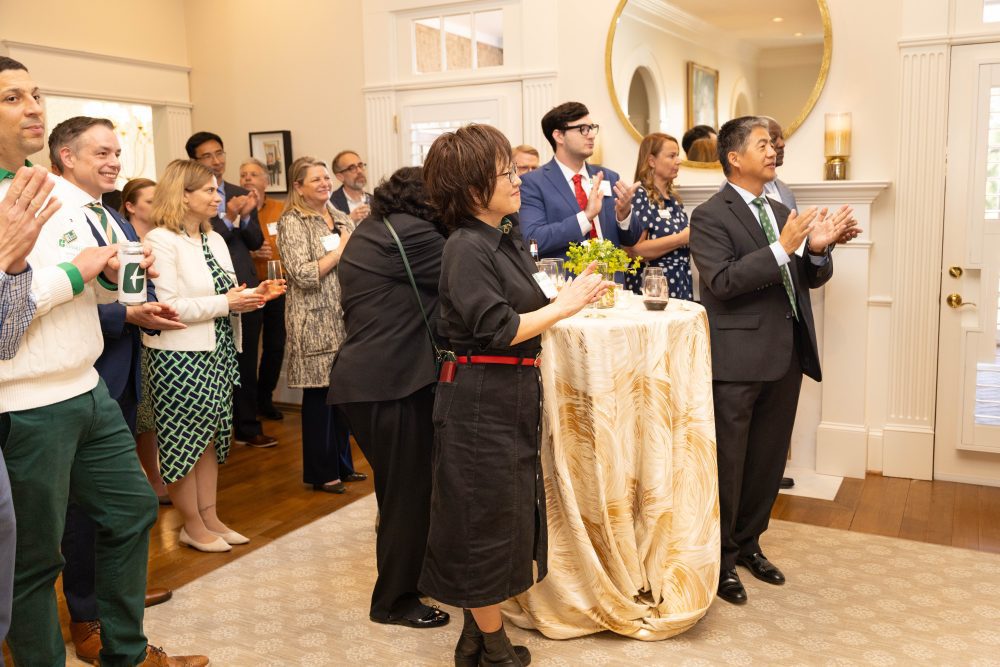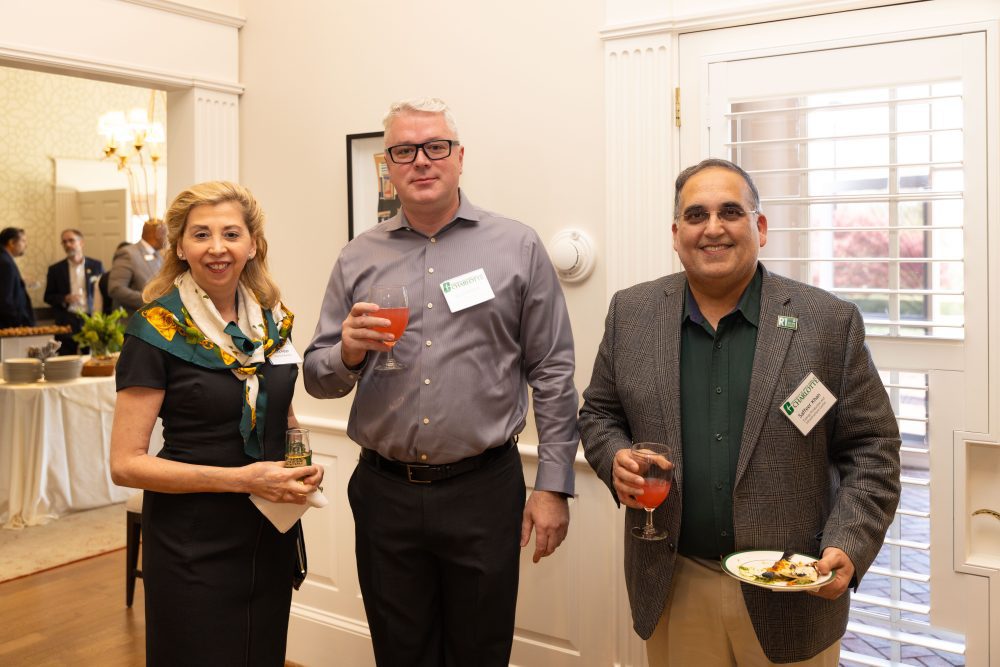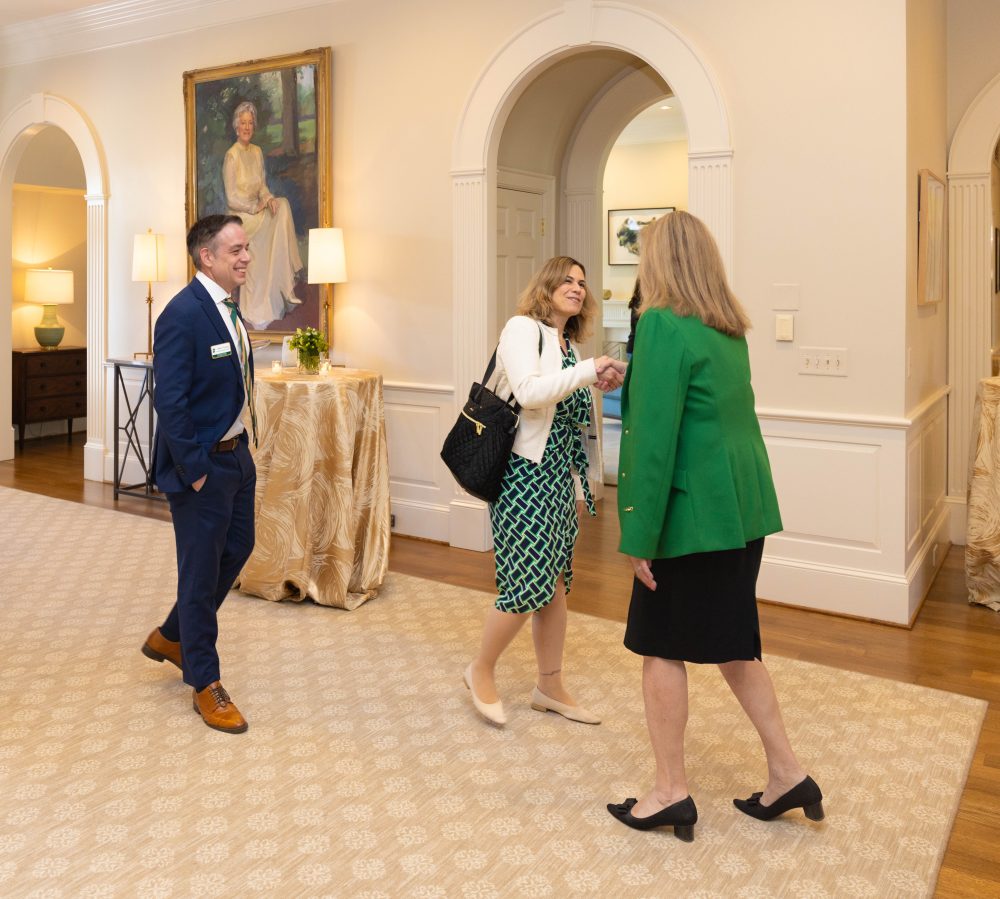Klein College hosts Carolina Symposium on Genome Integrity and Chromatin Regulation
More than 130 researchers from North and South Carolina convened in the UNC Charlotte Cone University Center on Wednesday, June 11, for the inaugural Carolina Symposium on Genome Integrity and Chromatin Regulation.
The symposium was hosted by the Department of Biological Sciences and the Center for Biomedical Engineering and Science in the Klein College of Science and highlighted the cutting-edge advances in genome integrity and chromatin regulation.
The conference was organized by Christine Richardson, chair of biological sciences and director of CBES; Shan Yan, professor of biology and associate chair for research; and Xiaojun Ren, associate professor and the Irwin Belk Distinguished Scholar of Biology.
The symposium fostered scientific exchange, collaboration, and networking among researchers at all career stages, and provided valuable learning opportunities for trainees, offering them a platform to present their work through the poster session and engage with leading experts in the field.
“We were honored to have the support of UNC Charlotte to host this successful symposium, with exceptional attendance and overwhelmingly positive feedback,” said Richardson. “The areas of genome integrity and chromatin regulation tie together the strengths of so many researchers in the Southeast, enabling us to leverage the success of this meeting toward building a bigger collaborative association between these institutions.”
Richardson and UNC Charlotte Vice Chancellor of Research John L. Daniels offered a welcome from the University.
Prominent researchers from Harvard University and Johns Hopkins University gave the keynote addresses, as well as sessions with invited speakers from Duke University and UNC Chapel Hill. Contributed speakers were selected from submissions and given by researchers from Clemson University, UNC Charlotte, NC State University, Wake Forest University, and the Medical University of South Carolina.
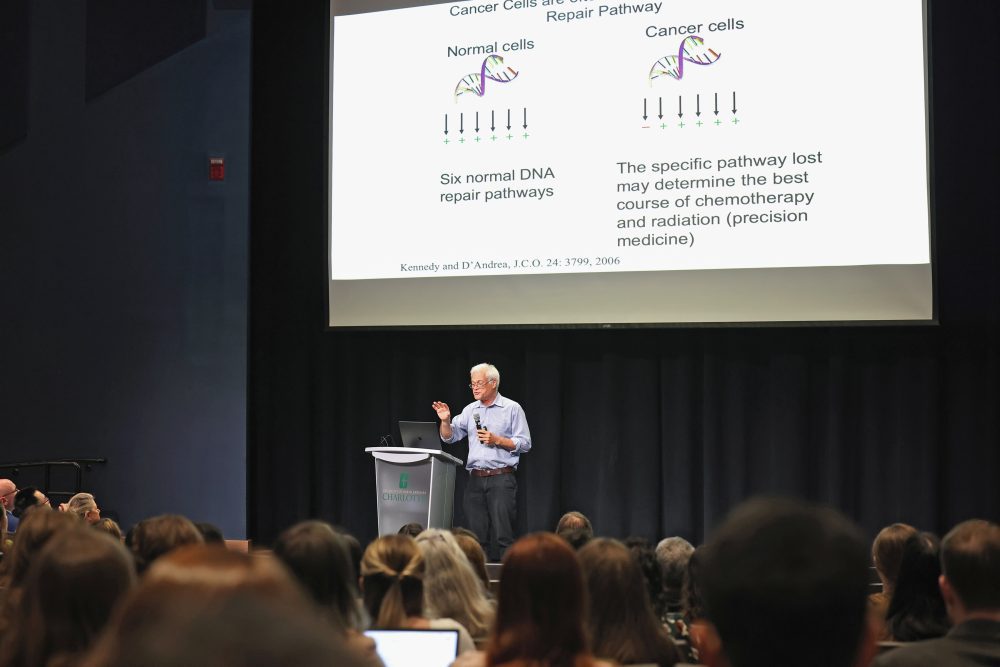
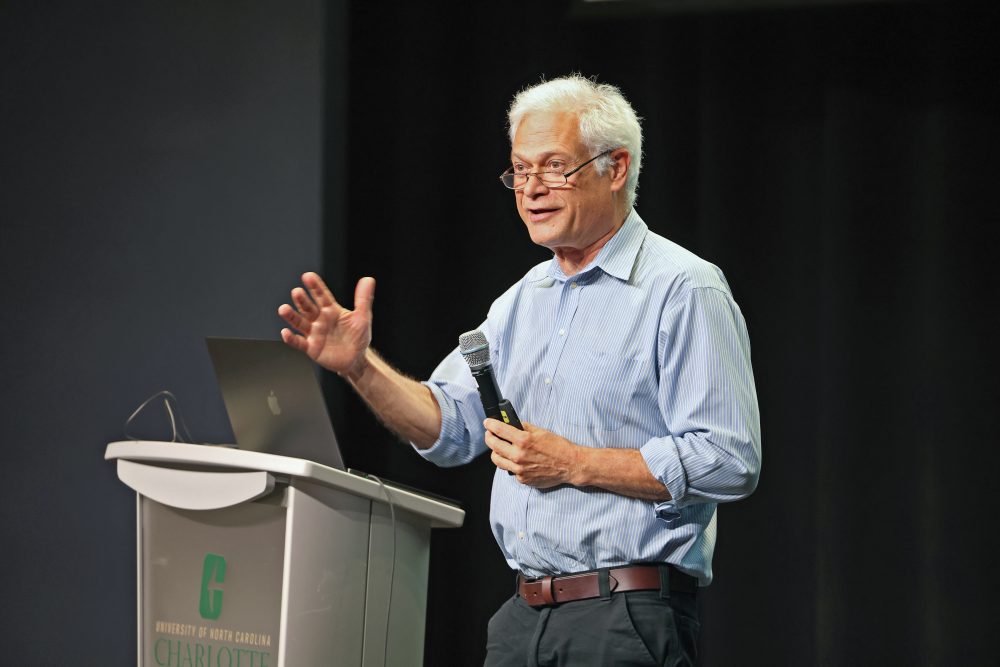
Alan D. D’Andrea, M.D., gave the morning keynote titled “CHAMP1 complex directs heterochromatin assembly and promotes homology-directed DNA repair.”
Alan D. D’Andrea, M.D., the Fuller-American Cancer Society Professor at Dana-Farber Cancer Institute and Harvard University and Member of the National Academy of Science and the National Academy of Medicine, delivered the morning keynote address.
Carl Wu, Ph.D., Bloomberg Distinguished Professor at Johns Hopkins University and Member of the National Academy of Science and the National Academy of Medicine, gave the afternoon keynote.
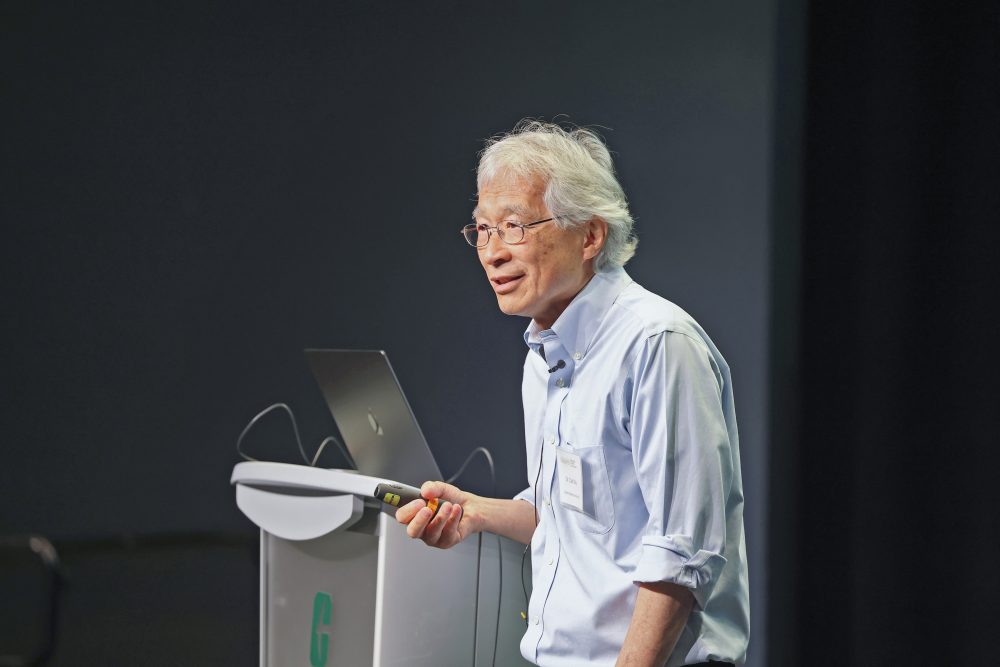
Carl Wu, Ph.D., delivered the afternoon keynote address titled “Shaping the dynamic chromatin landscape for gene expression at single-molecule resolution.”
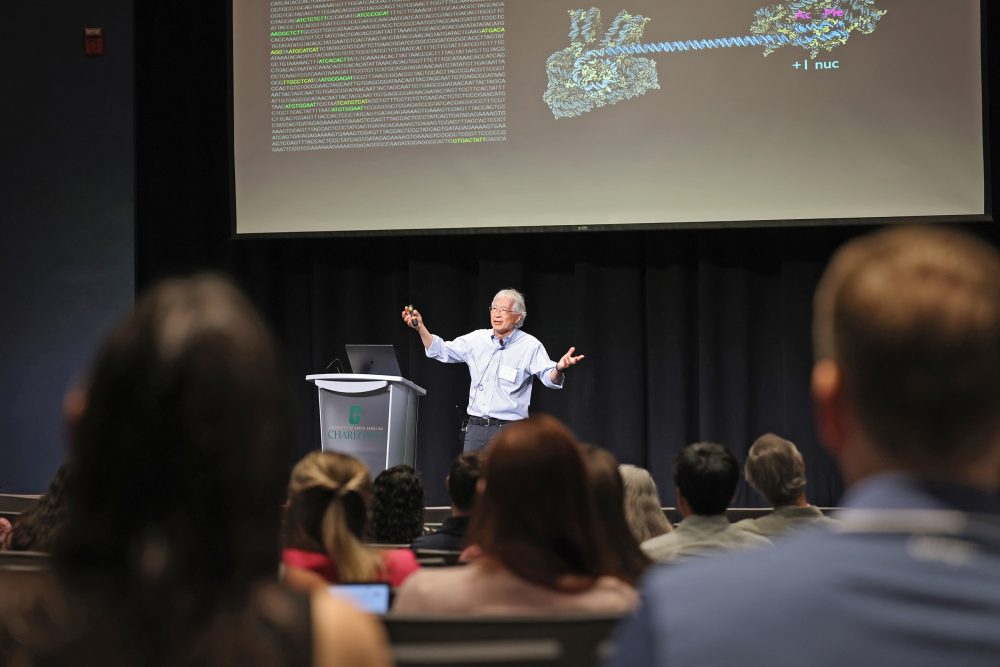
“There are many research labs with research interests in the areas of genome integrity and chromatin regulation at academic and research institutions in North Carolina and South Carolina,” said Yan. “This Carolina Symposium provides opportunities for investigators and researchers including trainees to disseminate research findings and foster potential collaborations. We hope this symposium will become an annual event in the future.”
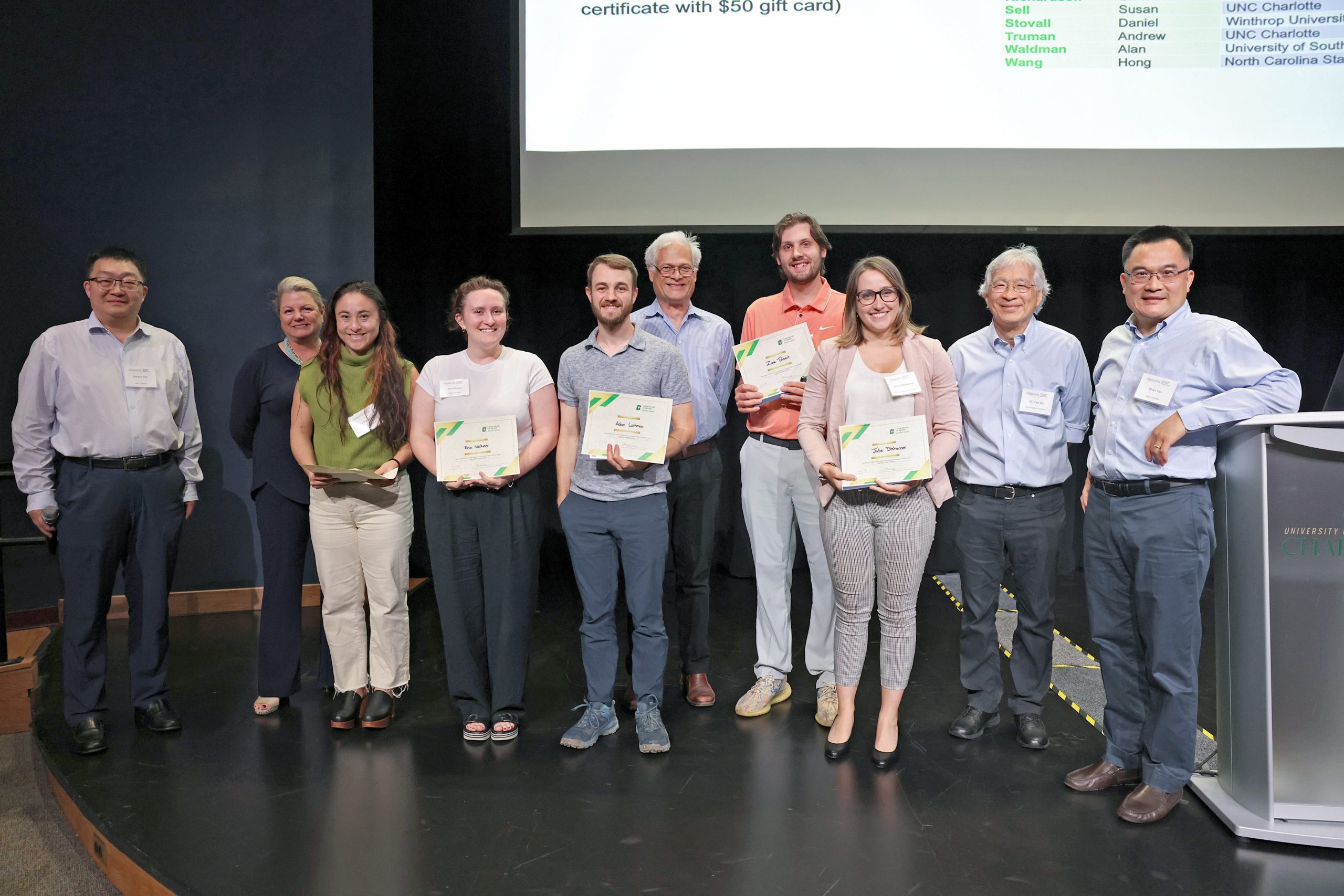
“I am excited that leading scientists have recognized UNC Charlotte as a premier hub for impactful research and training at the intersection of genome integrity and chromatin regulation,” Xiaojun said.
More than 45 researchers presented posters during the poster session, and winners were selected by a panel of 15 experts from Clemson University, Medical University of South Carolina, North Carolina State University, UNC Charlotte, UNC Chapel Hill, University of South Carolina, and Winthrop University.
Poster session winners received monetary prizes, including award certificates:
First prize winner: Hana Wasserman, Duke University
Second prize winner: Zane Tolbert, Clemson University
Third prize winner: Julie Disharoon, Medical University of South Carolina
Two honorable mentions: Erin Dickert, Duke University and Adam Luthman, UNC Chapel Hill
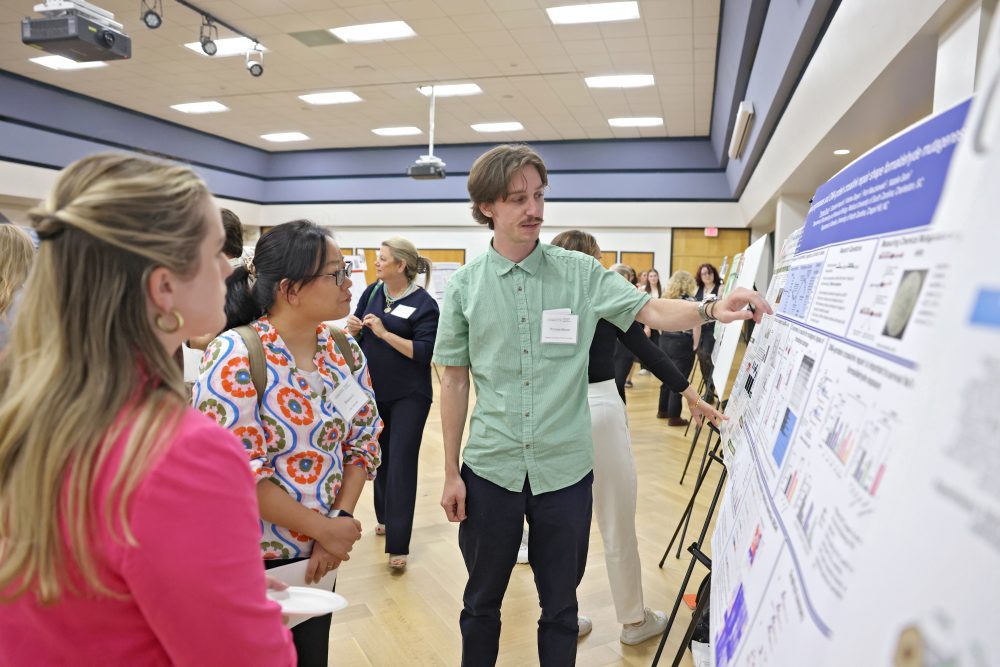
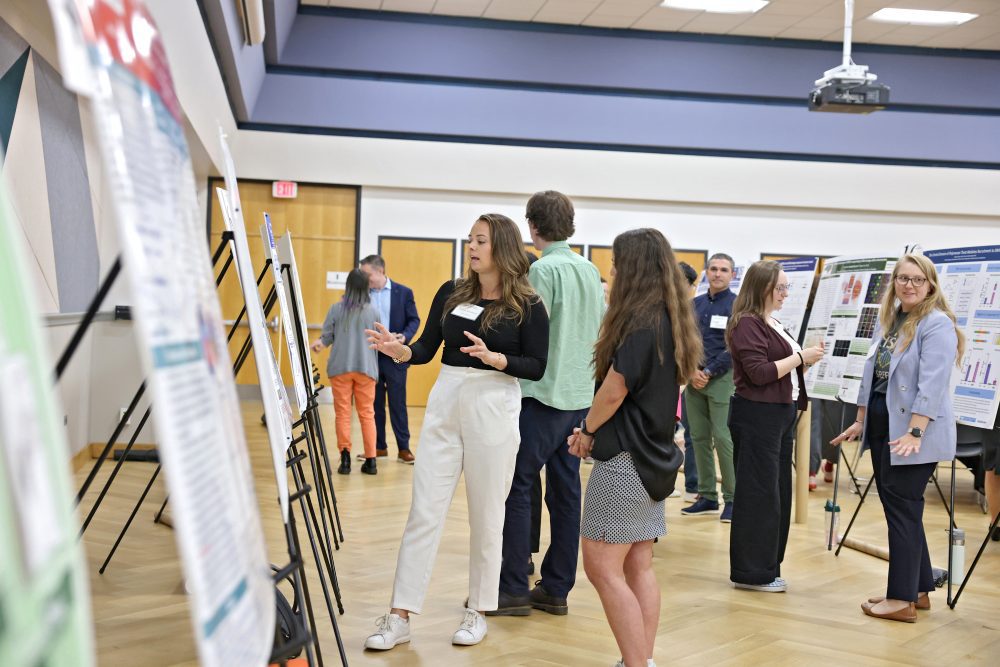
Inaugural Klein College awards and KNOBEL prizes recognize faculty and staff excellence
The Klein College of Science held their annual award ceremony on Monday, May 12, in the Cone University Center.
With the recent formation of the College, the KCOS Dean’s office established awards to recognize excellence in research, teaching and mentoring, leadership and service, and community engagement. These recognitions will be awarded annually following a nomination period.
The 2025 nominations were reviewed and awarded by teams of employees from inside Klein College as well as across the University, and recognized staff; early and advanced career faculty; research and teaching faculty; and part- and full-time faculty.
The College also established a set of KNOBEL prizes (KCOS prize for NOtaBLe Achievements) based on namesake Fred Klein’s challenge to KCOS to develop a future Nobel laureate.
Klein College of Science Founding Dean Bernadette Donovan-Merkert presented the awards and prizes, along with Adam Reitzel, associate dean for research and graduate education, Banita Brown, associate dean for undergraduate student affairs, and Matthew Parrow, associate dean for academic administration.
Faculty who are retiring at the end of June were celebrated:
- Xingde Dai, professor of mathematics, was honored for 35 years of service at UNC Charlotte (not pictured).
- Adalira Saenz-Ludlow, professor of mathematics education, was honored for 30 years of service at UNC Charlotte.
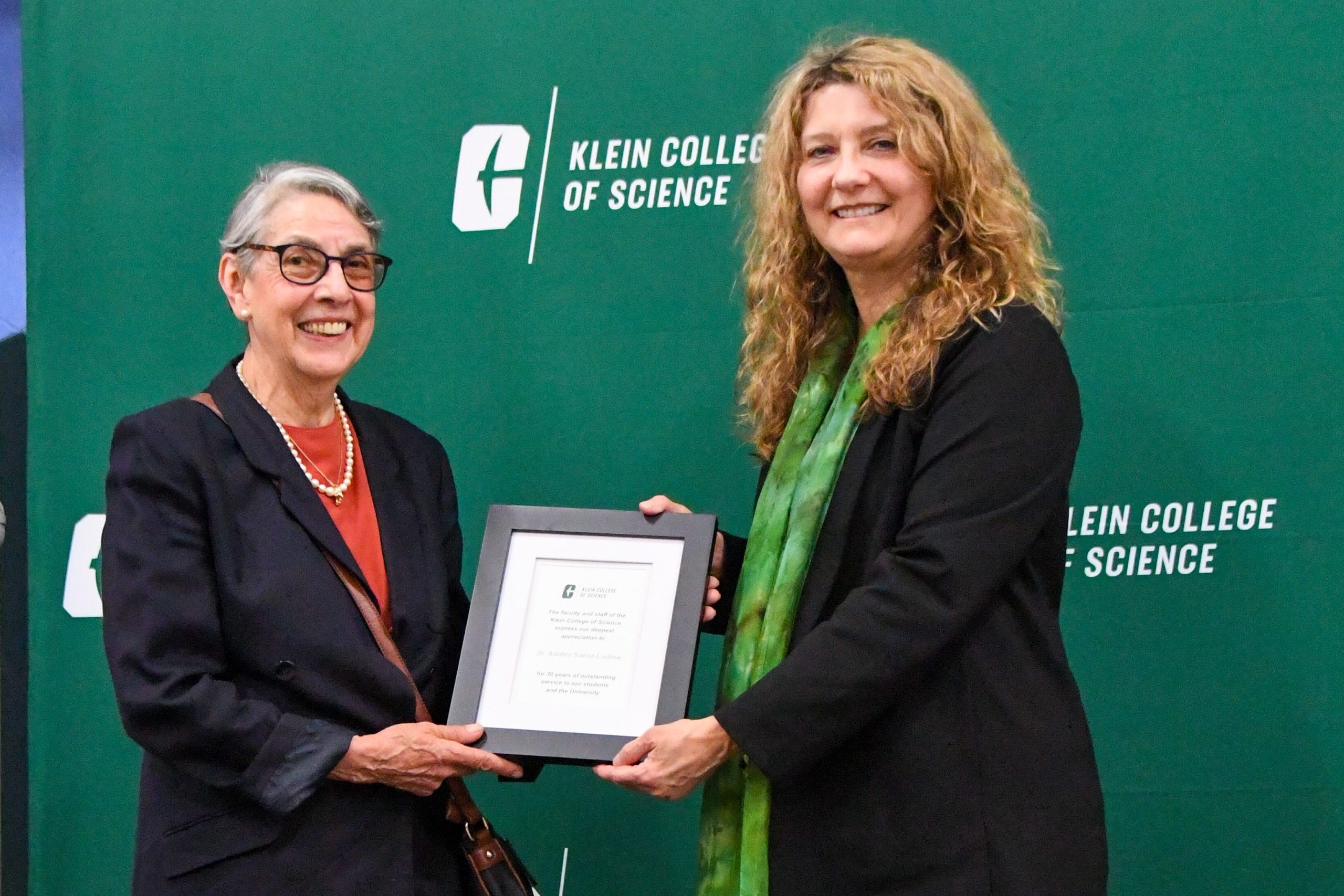
2025 Klein College Award winners
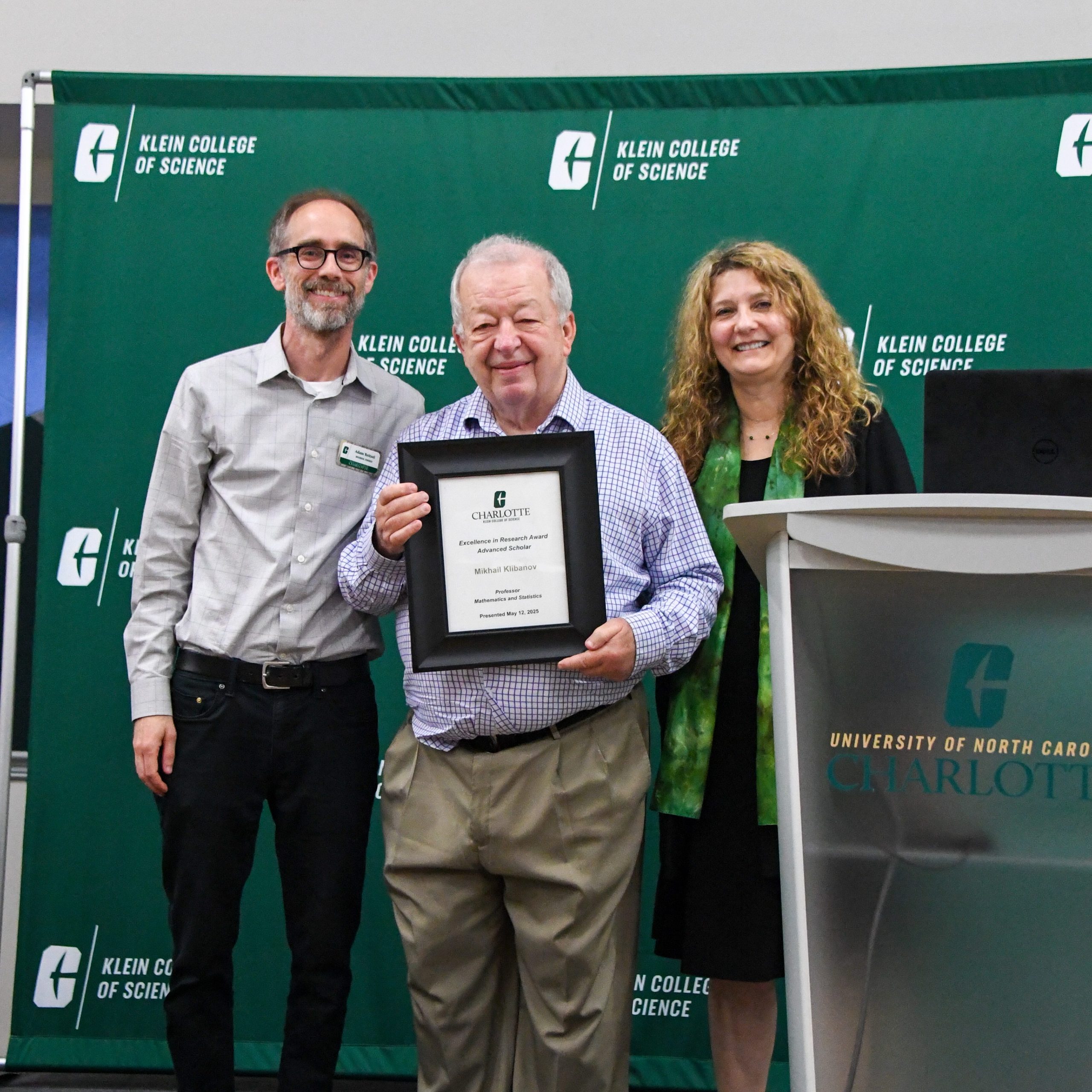
KCOS Award for Excellence in Research – Advanced Scholar
Recipient:
Mikhail Klibanov, mathematics and statistics
Honorable Mentions:
- Shan Yan, biological sciences
- Juan Vivero-Escoto, chemistry
KCOS Award for Excellence in Research – Rising Star
Recipients (not pictured):
- Danillo Augusto, biological sciences
- Kristen Funk, biological sciences
KCOS Award for Excellence in Graduate Teaching or Mentoring
Recipient:
M. Brittany Johnson, biological sciences
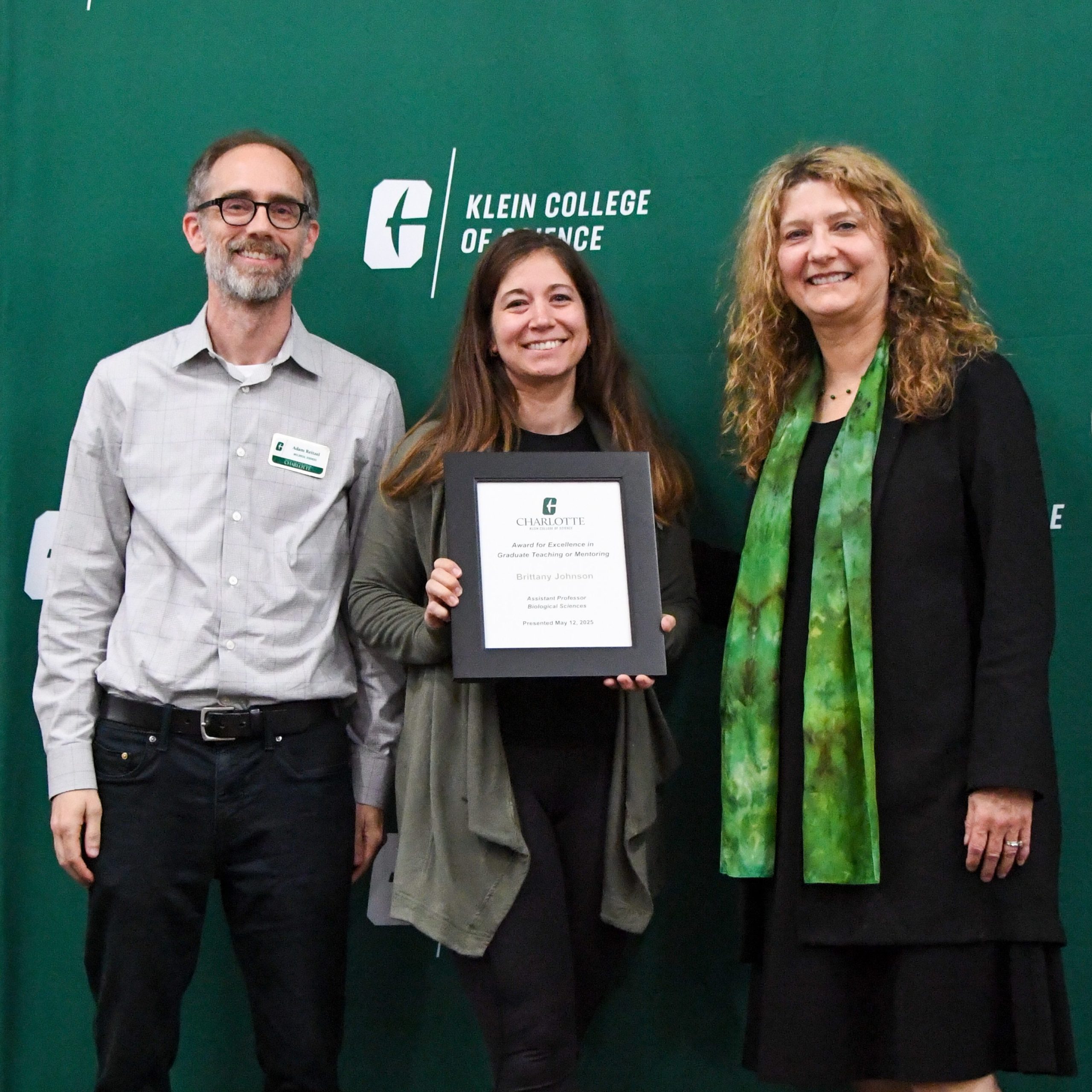
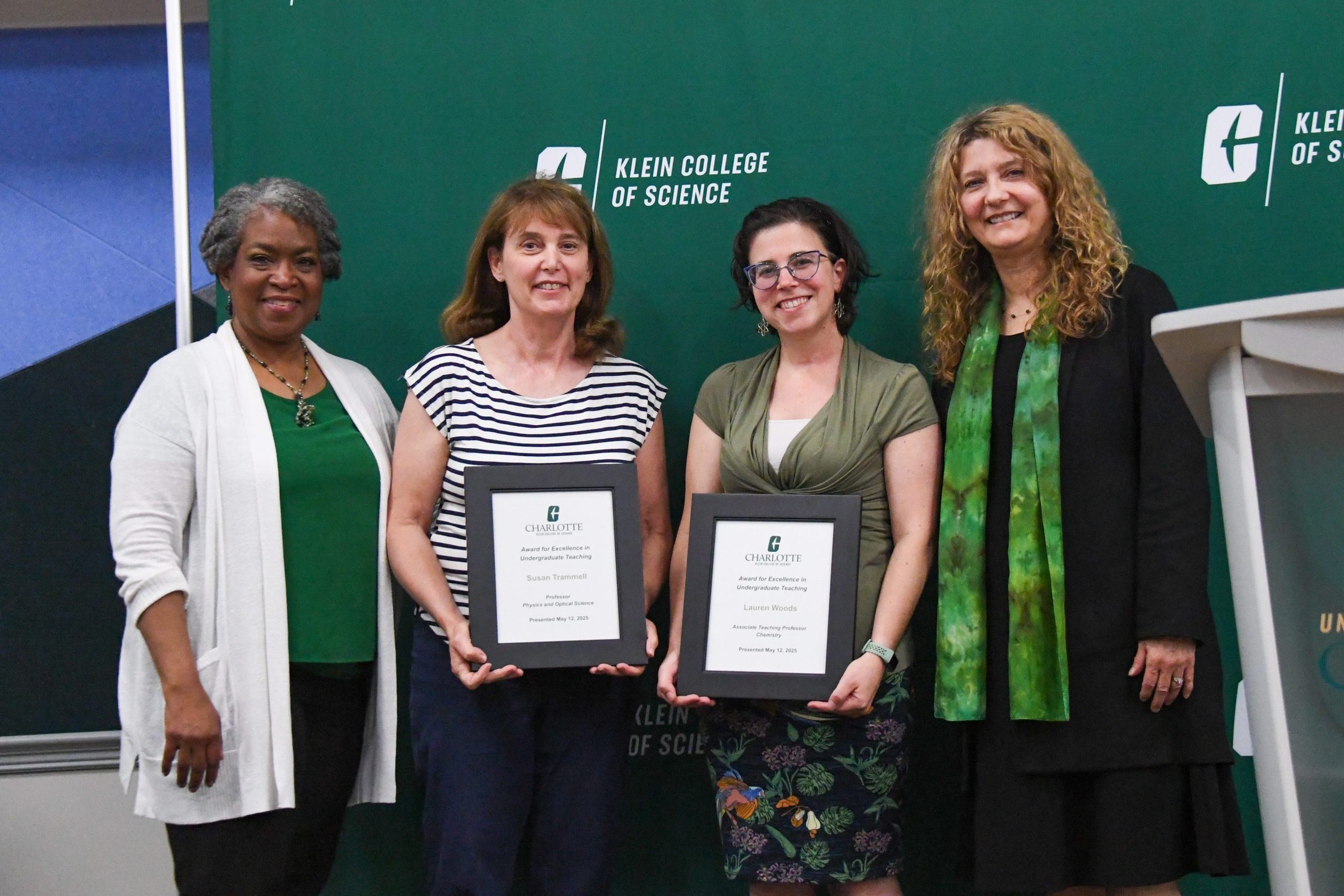
KCOS Award for Excellence in Undergraduate Teaching
Recipients:
- Susan Trammell, physics and optical science
- Lauren Woods, chemistry
KCOS Award for Excellence in Teaching by a Part-Time Faculty Member
Recipient:
Umesh Silwal, physics and optical science
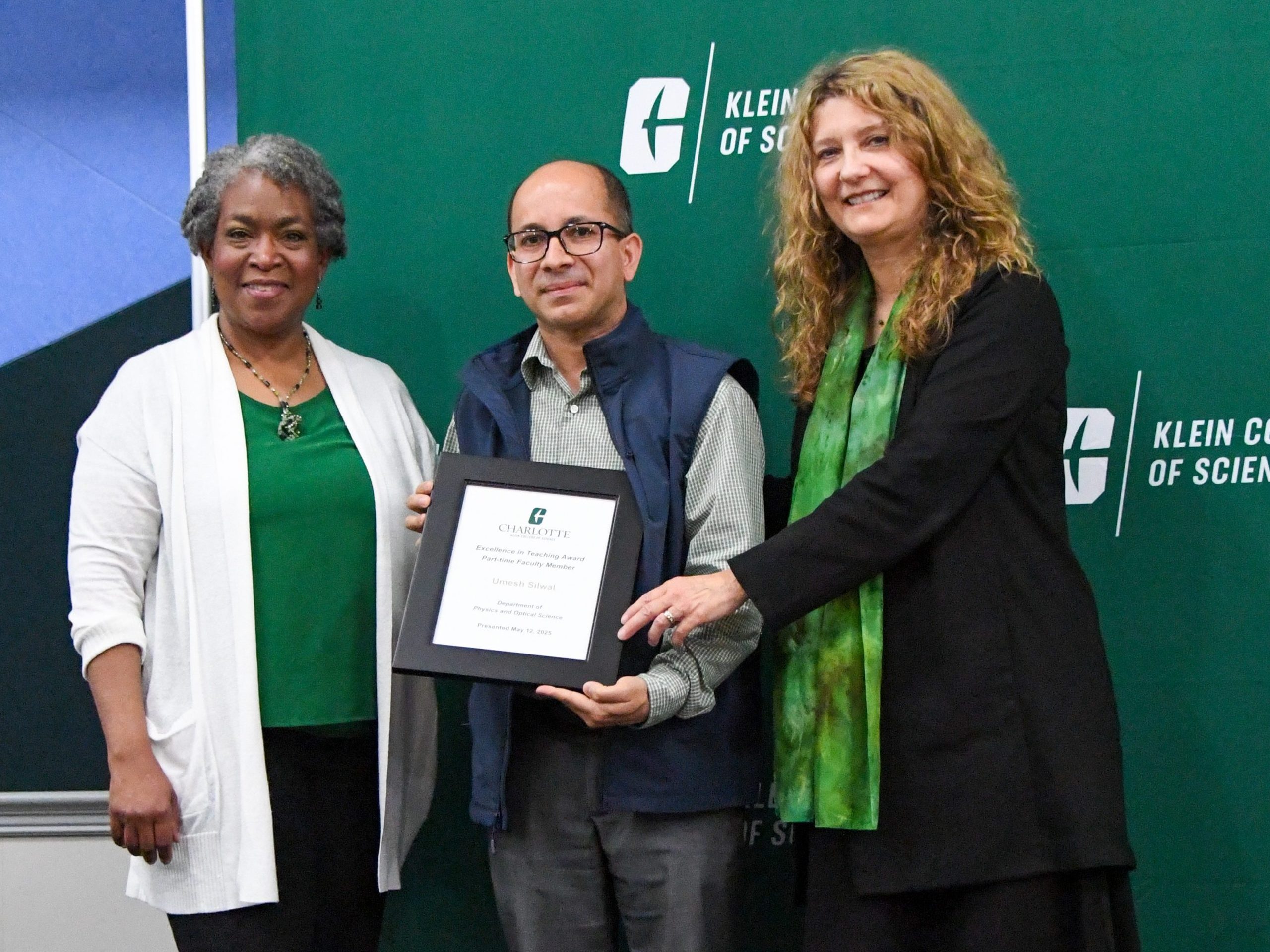
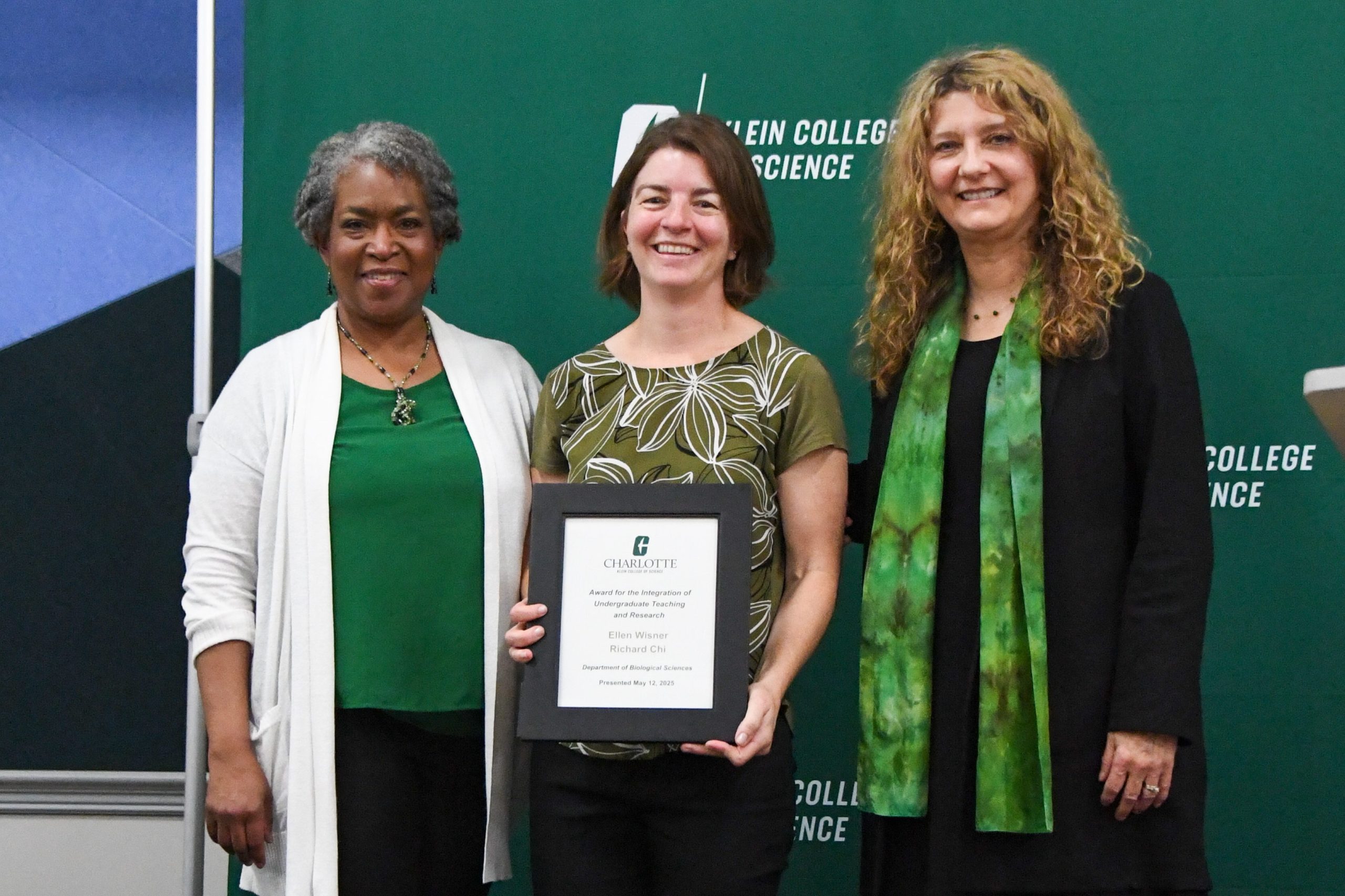
KCOS Award for the Integration of Undergraduate Teaching and Research
Team Recipient: Richard Chi and Ellen Wisner, biological Sciences
KCOS Faculty Leadership Award
Recipients:
- Tonya Bates, biological sciences
- Michael Walter, chemistry
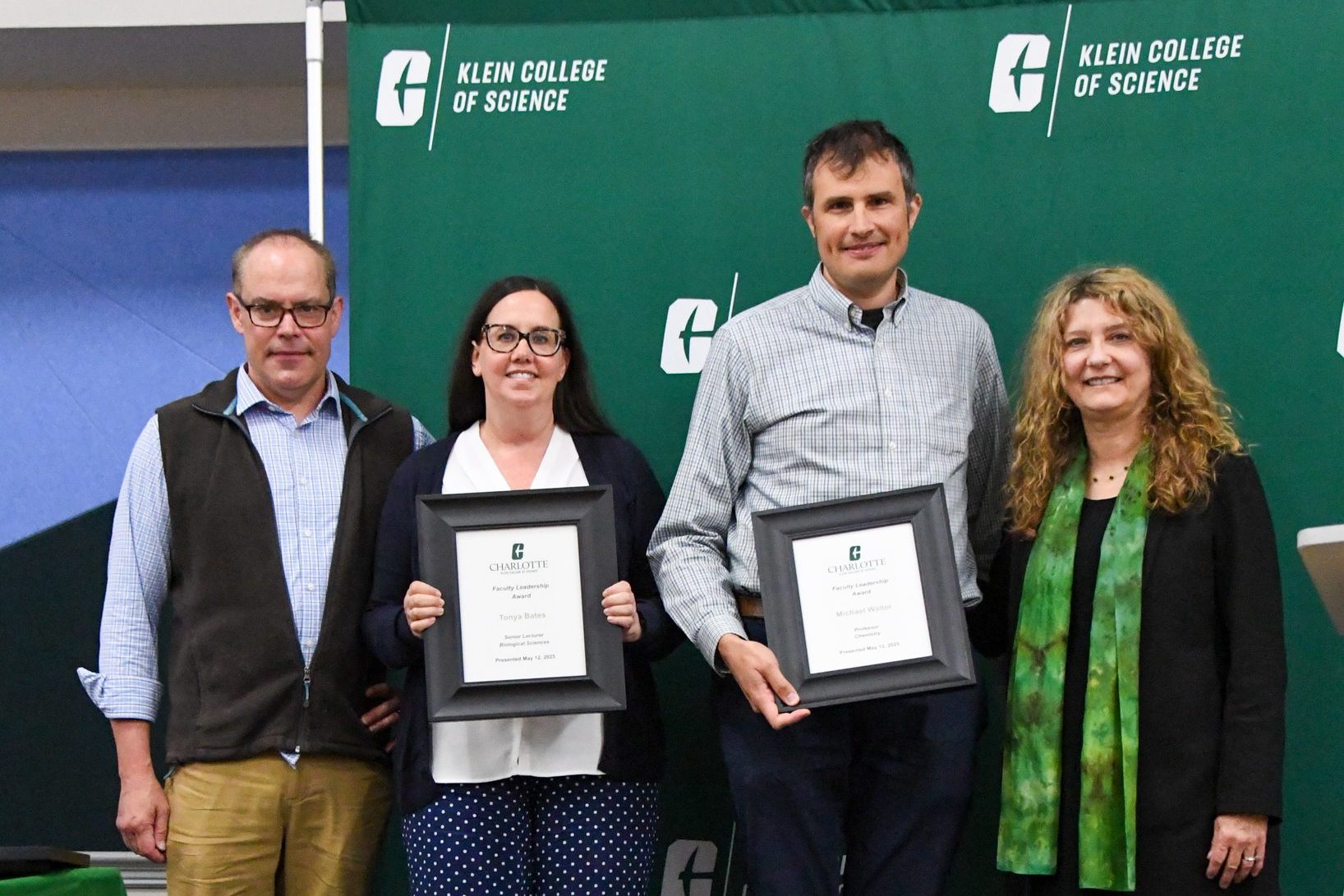
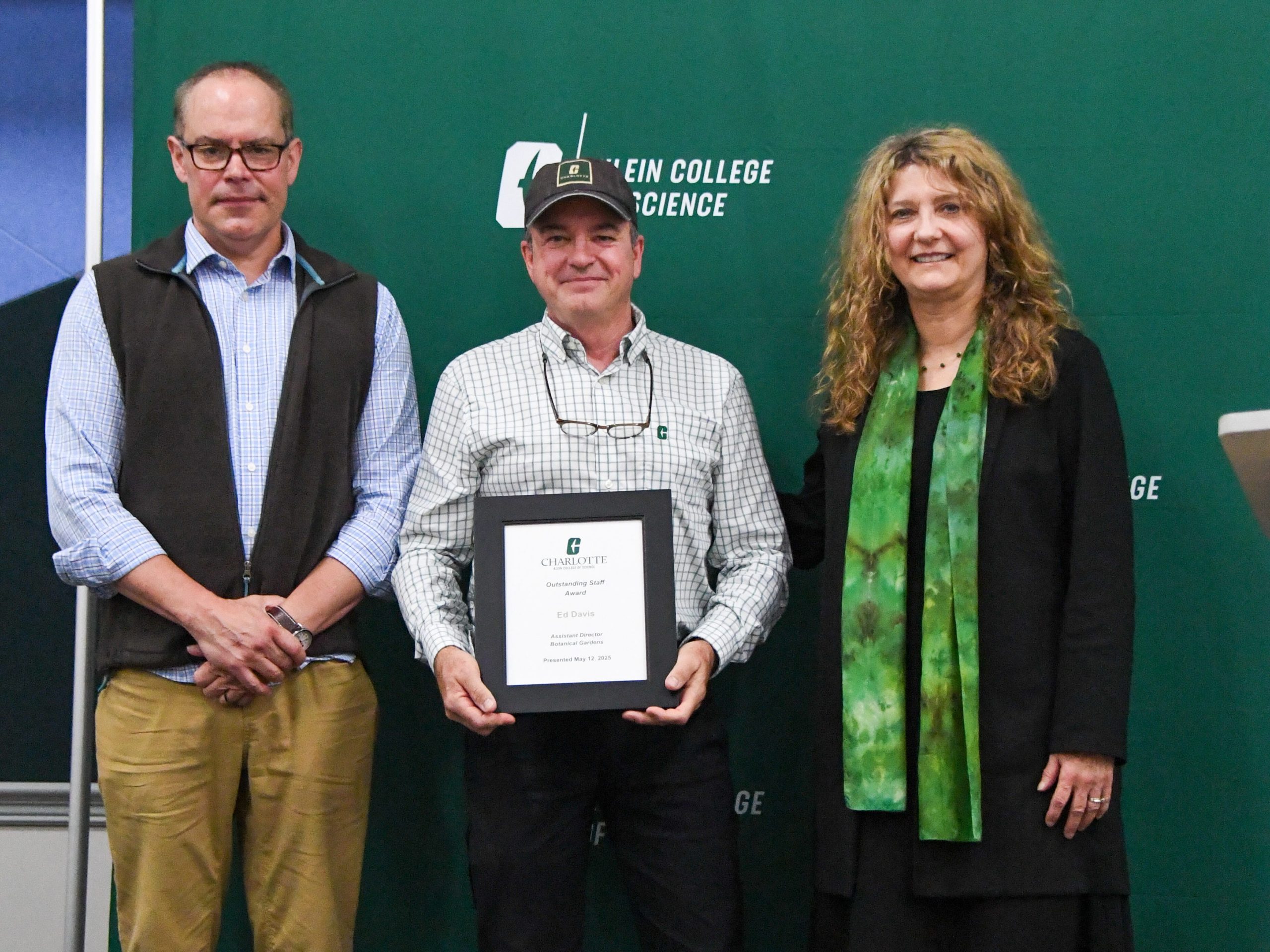
KCOS Outstanding Staff Award
Recipients:
- Lucy Chen, biological sciences
- Ed Davis, Botanical Gardens
- Quincey Hinson, mathematics and statistics
KCOS Community Engagement Award
Team Recipient:
Rosario Porras Aguilar (Physics and Optical Science) and Label-Free STEM Education Team
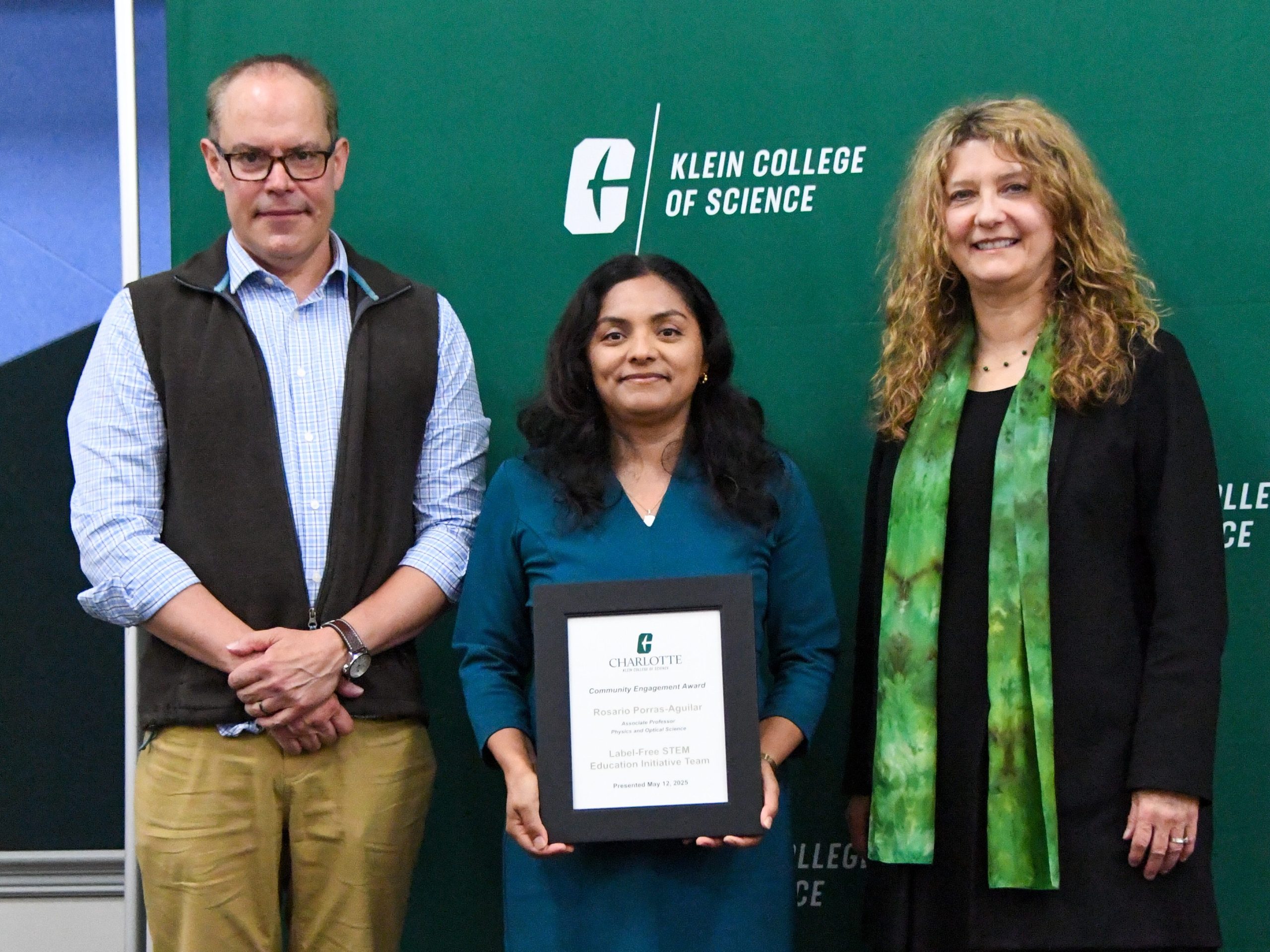
2025 Klein College KNOBEL Prizes
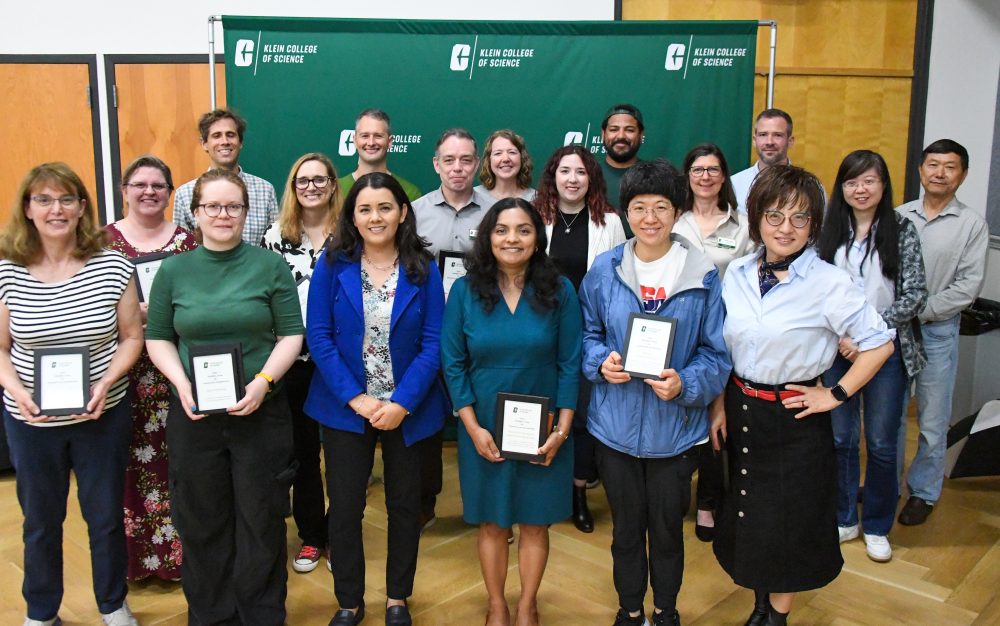
KNOBEL Prize for Research and Scholarship
- Bao-Hua Song, biological sciences
- Andrew Truman, biological sciences
- Shan Yan, biological sciences
- Jay Foley, chemistry
- Will Brian, mathematics and Statistics
- Kevin McGoff, mathematics and Statistics
- Rosario Porras-Aguilar, physics and optical science
- Susan Trammell, physics and optical science
KNOBEL Prize for Teaching
- Team: Chemistry– Kathy Asala, Eric McKenzie, Susan Michael, Jessica White
- Team: QEP Coordinators for Courses, GTAs and Preceptors– mathematics and statistics
- Anna Athanasopoulou
- Sarah Birdsong
- Caylah Crosby
- Allison Alowson
- Ree Linker
- Wan Othman
- Jennifer Reed
- Scott Wilde
KNOBEL Prize for Leadership and Service
- Morgan Carter, biological sciences
- Team: Michael Grabchak, Xingjie (Helen) Li, Kevin McGoff and REU Team
KNOBEL Prize for Community Engagement
Sarah Birdsong, mathematics and statistics
NCInnovation awards grants to Pinku Mukherjee and Susan Trammell
Klein College of Science researchers Pinku Mukherjee and Susan Trammell were each awarded a research and development grant from NCInnovation this week. NCInnovation is a nonprofit organization that bridges the gap between academia and industry to help advance research from North Carolina public universities from proof-of-concept to commercial investment and viability.
The grants were awarded after a multi-month review and evaluation process led by external panels of subject matter experts and overseen by the Program Committee of NCInnovation’s Board of Directors.
Jordan Poler, professor of chemistry in the Klein College of Science, received the NCInnovation grant last year and has made strides in regenerable filtration that removes PFAS and forever chemicals from water supplies.
Mukherjee, the Irwin Belk Distinguished Professor in Cancer Research, along with team member Ru Zhou, associate research professor in biological sciences, are developing a pancreatic cancer therapeutic using a novel T-cell engager derived from a patented monoclonal antibody that was also developed at UNC Charlotte. The T-cell engager has shown significant efficacy in treating chemotherapy-resistant pancreatic cancer as the tumor-specific protein is found on 85% of solid tumors. Pancreatic cancer is particularly deadly because it is typically diagnosed only in late stages due to a lack of screening tools and the fact that it progresses without obvious symptoms.
Trammell, professor of physics and optical science, and team developed an innovative laser technology, called Light-Assisted Drying, to enable storage of vaccines and other therapeutics at room temperature. This technology, which was recently awarded U.S. Patent 11,849,722, is a promising alternative to freeze-drying for storing and stabilizing proteins. Traditional preservation methods are slow, energy-intensive and involve complicated procedures. LAD, in under three hours, uses a near-infrared laser to gently remove water from the material and encase it in a protective sugar-based coating, preserving both stability and effectiveness. It works with a wide range of biological materials and offers a practical substitute for refrigeration-dependent systems, which could eliminating the need for refrigeration during transport and storage would reduce costs by up to 80%.
Mukerjee and Trammell were among 17 awardees statewide from 12 institutions:
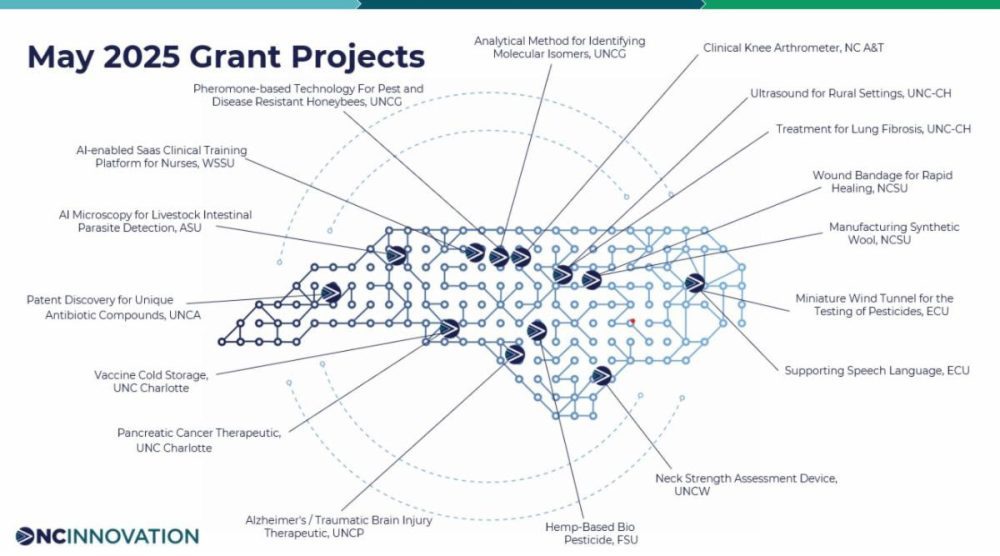
Read more about the NCInnovation grants for Mukherjee and Trammell.
Three KCOS faculty serve as University Marshals for commencement
Juan Luis Vivero-Escoto, John Taylor and Kirill Afonin from the Klein College of Science were selected to serve as University Marshals for three of the May 2025 commencement ceremonies.
Faculty are selected for this prestigious role based on their leadership and service to the campus community, and faculty excellence in their teaching and professional achievements.
University Marshals hold the mace and lead the procession of platform guests onto the stage at the start of commencement.
Juan Luis Vivero-Escoto
Juan Luis Vivero-Escoto, professor of chemistry, served as the University Marshal for the doctoral hooding ceremony on Thursday, May 8. Vivero-Escoto serves as director of the UNC Charlotte Center for Innovation, Translational Research and Applications of Nanostructured Systems, CITRANS. In 2024, Vivero-Escoto was awarded the Harshini V. de Silva Graduate Mentor Award, which recognizes mentorship of graduate-level students.
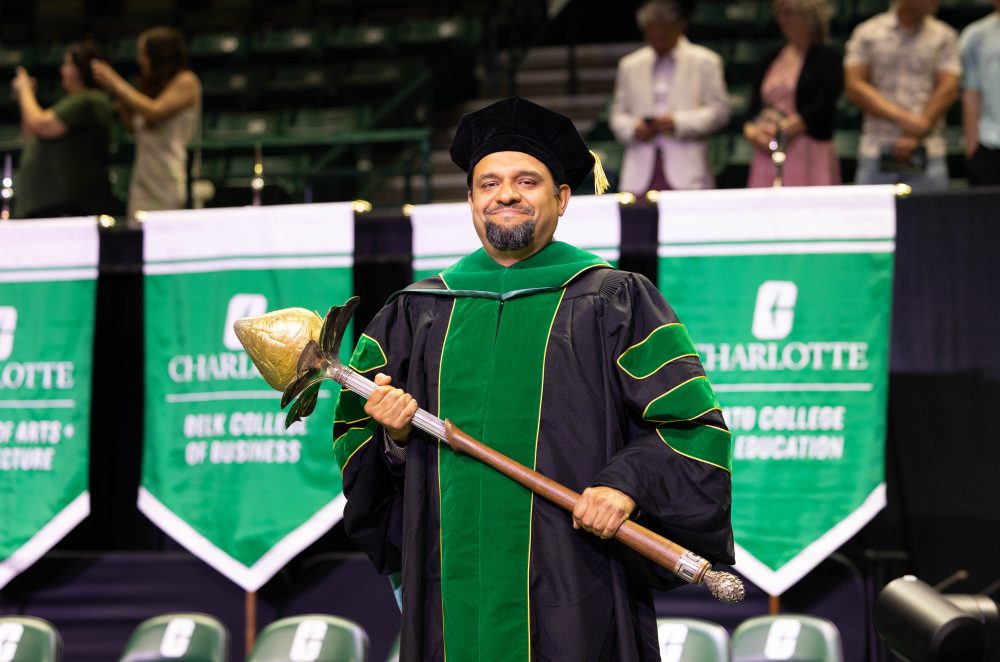
John Taylor
John Taylor, teaching professor of mathematics and statistics, was selected as the University Marshal for the morning ceremony on Saturday, May 10, for the Klein College of Science and College of Humanities & Earth and Social Sciences undergraduate commencement.
Taylor has taught at UNC Charlotte since 2006, teaching undergraduate and graduate level classes and as a tutor in the Mathematics Learning Center. Taylor, beloved by students and known for his innovative, student-centered approach to teaching mathematics, was a finalist for the UNC Charlotte Award for Teaching Excellence in 2024.
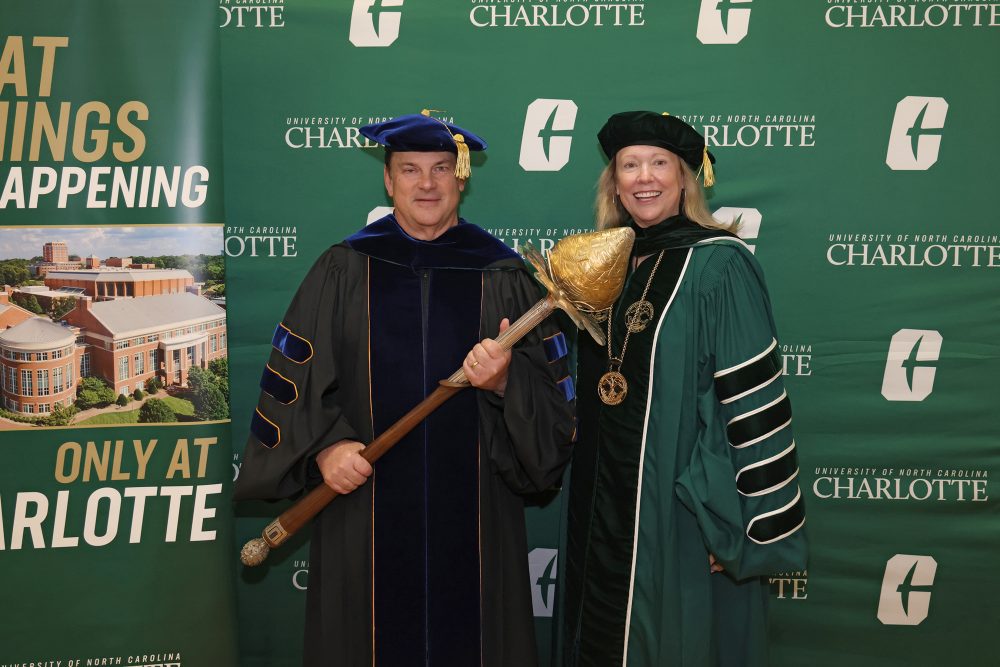
Kirill Afonin
Kirill Afonin, professor of chemistry, served as the University Marshal for the master’s degree and graduate certificate ceremony on Saturday, May 10, for the Graduate School.
Since joining UNC Charlotte in 2015, Afonin has received numerous honors and recognitions, including 10 patents, more than 30 research highlights published about his work and dozens of oral presentations and invited talks. He was awarded the First Citizens Bank Scholars Medal in 2023 and recently was recognized with the Harshini V. de Silva Gradaute Mentor Award. Afonin is internationally recognized as a leader in RNA nanotechnology, one of the most significant and rapidly evolving fields of science.
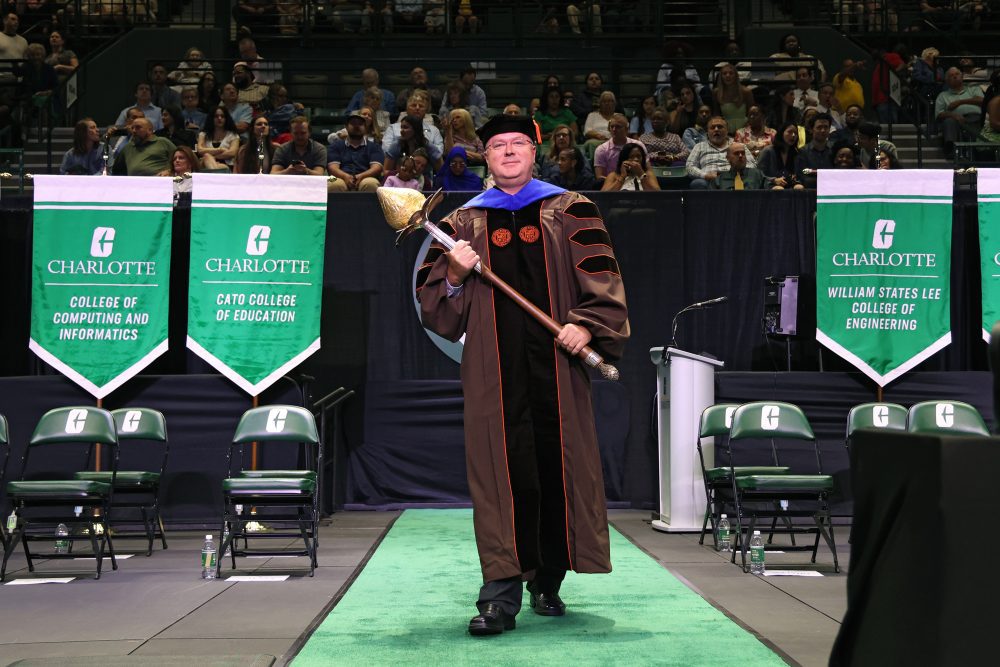
Kirill Afonin recognized with de Silva graduate mentor award
Kirill Afonin, professor of chemistry in the Klein College of Science, was named one of two recipients of the Harshini V. de Silva Graduate Mentor Award, presented Thursday, May 1, at the Spring Faculty Awards ceremony in the Popp Martin Student Union.
Afonin is internationally recognized as a leader in RNA nanotechnology, one of the most significant and rapidly evolving fields of science. Since joining UNC Charlotte in 2015, Afonin has received numerous honors and recognitions, including 10 patents, more than 30 research highlights published about his work and dozens of oral presentations and invited talks. One of his review articles was recognized by Web of Science for being in the top 1% of papers most cited in the field of pharmacology and toxicology.
“He is one of our University’s superstars with a phenomenal skill set, but perhaps his greatest strength is his ability to mentor students in research,” stated Thomas Schmedake, professor and chair of chemistry. “In just over eight years, Kirill has established one of the leading RNA nanotechnology labs, with over 100 publications and more than $4.7 million in external funding.”
Afonin’s students have contributed to more than 40 research papers, three educational manuscripts, 13 review articles and various other publications, including an editorial, invited commentary and research highlight, all in peer-reviewed journals. Many of his Ph.D. students graduate with more than 10 publications, with one graduating with 34 publications and a book.
“What sets Dr. Afonin apart is his genuine interest in the lives and well-being of his students,” said Weina Ke ’20 Ph.D., a scientist and CaNanoLab data curator in the Bioinformatics and Computational Science Department at the Frederick National Laboratory for Cancer Research in Frederick, Maryland. “He often took the time to inquire about my health, my family and overall happiness. His support extended beyond the academic realm, creating a nurturing and inclusive atmosphere within his research group.”
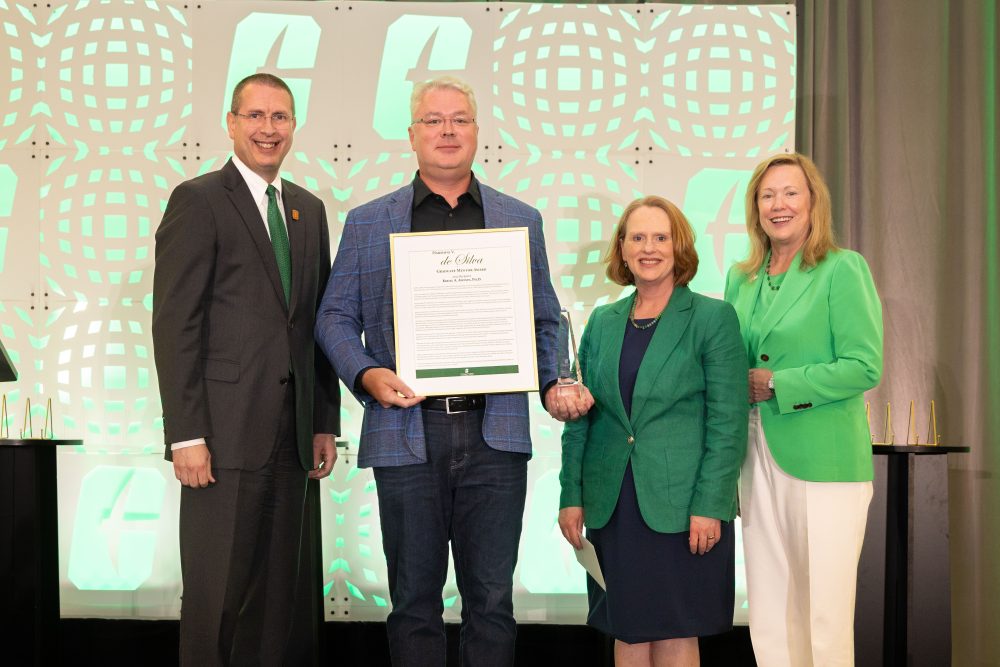
“Dr. Afonin’s contribution to the education of the next generation of scientists is the epitome of outstanding mentorship,” said Marina Dobrovolskaia, laboratory director of operations and head of the immunology section for the Nanotechnology Characterization Lab in Frederick, Maryland. “His research inspires students and collaborators for whom he serves as a role model. In his lab, he has created a unique, inclusive and diverse environment, allowing the students to thrive academically, professionally and personally. Not surprisingly, his graduate students leave the lab with publications and experiences, allowing them to secure highly competitive jobs at leading research institutions.”
Afonin, who completed a doctorate in photochemistry and a graduate certificate in bioinformatics, proteomics/genomics from Bowling Green State University in a joint program with the Medical University of Ohio and the University of Toledo, also holds a Master of Science in Chemistry of Natural Compounds from Saint Petersburg State University in Russia.
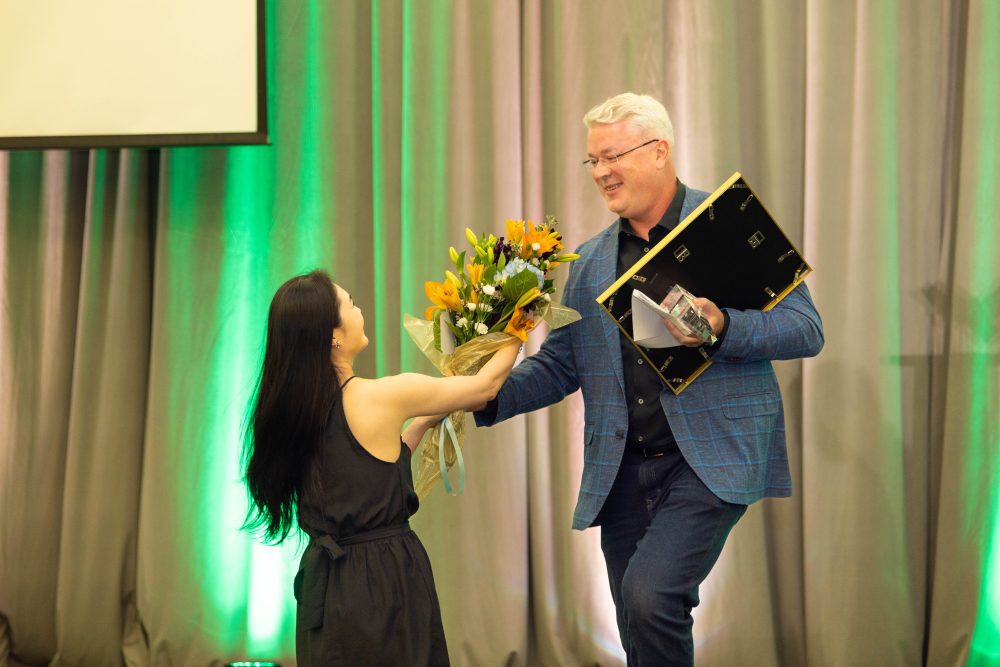
The Harshini V. de Silva Graduate Mentor Award honors its namesake, an exceptional teacher, brilliant scholar and researcher and devoted servant of her profession and community. The award is given annually to the faculty member whose commitment to students, research and scholarly inquiry most closely exemplifies the spirit of de Silva.
Read more about UNC Charlotte’s 2025 Spring Faculty Award recipients.
All Gas, No Brakes: Allison Reed Speeds to Spring Commencement with Research Experience and Lifelong Connections
Nearly every day, Allison Reed straps on a helmet, mounts her 2006 Yamaha R6 heading for UNC Charlotte, where she applies physics and mathematics to advanced real-world problems. Her motorcycle, a 599cc racing bike that can go from zero to 60 mph in three seconds and reach a top speed of 165 mph, is a marvel of physics itself.
“I love bikes because they’re fun but also because they are an amazing display of physics,” Reed said. “If a career in research doesn’t work out, I’d love to work in the motorcycle racing industry, designing new bikes and using physics to ensure optimal performance.”
At Spring Commencement, Reed will graduate with degrees in physics and mathematics, research credits, the support of research faculty and a cohort of lifelong friends. But her path to this point wasn’t straightforward. On asphalt, and in life, she embraces sharp turns.
Reed’s first love was horses. She has memories from age 5 trucking around on ponies. As she got older she got a horse of her own and progressed from lessons to competitions. After graduating high school, she moved to Colorado to study equine behavioral science at Colorado State University in Fort Collins. However, she realized that as much as she loved horses, and still does, she didn’t want to spend her career in the barn.
Reed returned home to North Carolina, and while mulling over a path forward, she recalled all of the physics and science documentaries she watched with her father growing up and the hands-on physics class she took in high school. Both scratched an intellectual curiosity that inspired her to pursue it as a major. She applied to UNC Charlotte and from there she was off and running.
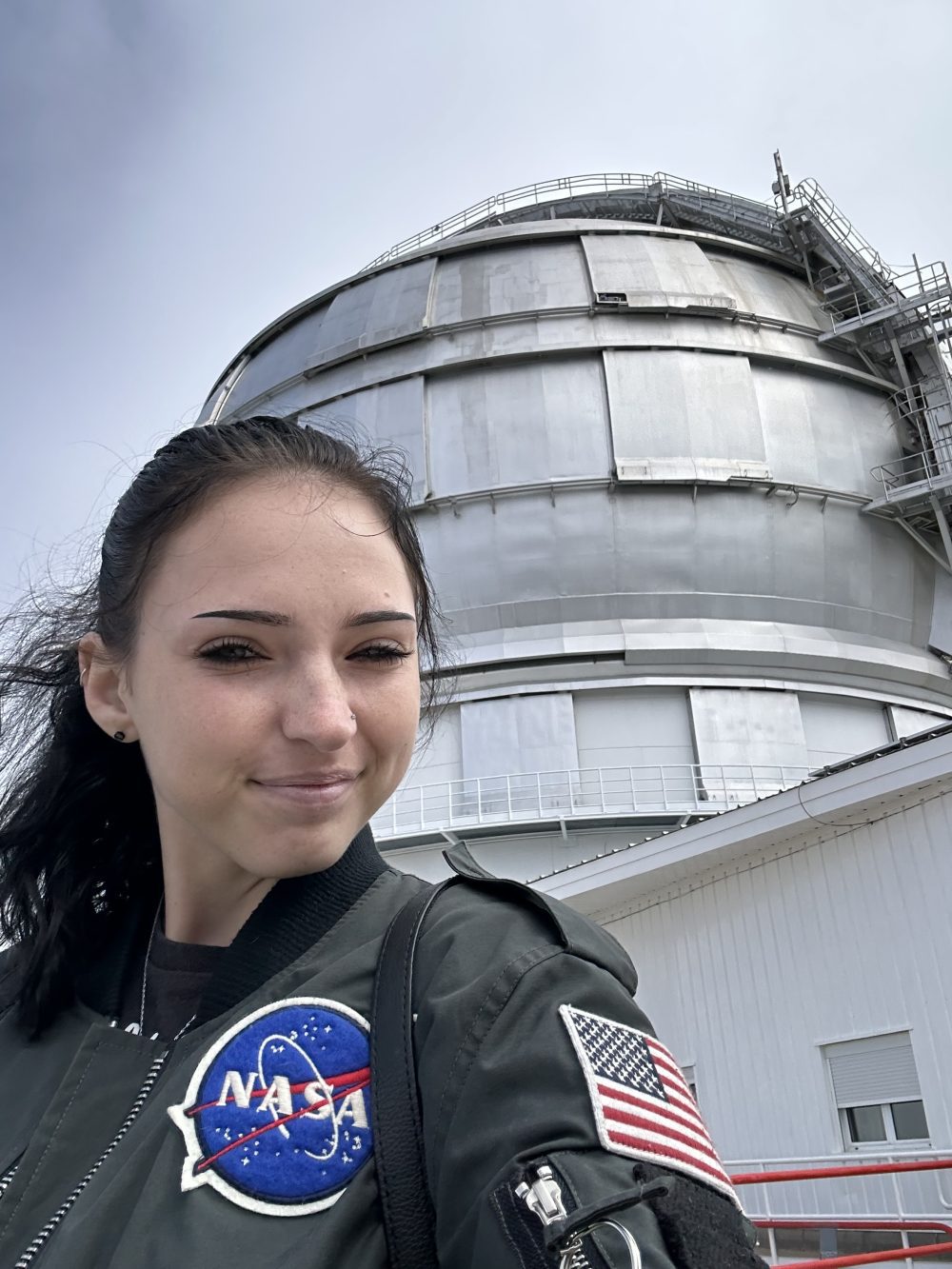
Research Under the Skin and Over the Moon
Research has been foundational to Reed’s experience at Charlotte. From May 2022 to January 2023, she worked with graduate student Maddie Kern ’23, M.S., on her Optical Science and Engineering master’s thesis that used thermal imaging to view blood vessels to aid non-invasive procedures. She also did research for credit in spring 2024 for the Department of Mathematics and Statistics, where she and two friends, Zach Bessant and Anastasia Kolesnikov, wrote a paper on the possibility of getting to Mars by slingshotting around the moon.
“My ultimate goal is to become a theoretical physicist with a concentration in astrophysical general relativity/time/gravity and for that type of job, research is absolutely vital,” Reed said. “I also just find it fascinating. Without research, we wouldn’t know of the society we have today.”
Currently, Reed and Ritchie Dudley, assistant undergraduate lab coordinator, are researching Hawking radiation and quantum mechanics by simulating a black hole with fiber optic cables.
Finding Community in Niner Nation
The Department of Physics and Optical Science, housed in the Klein College of Science, is a tight-knit community. Reed recalls meeting fellow majors on day one and then seeing them from course to course throughout their college careers. They completed projects together, helped one another with homework and caught up over dinners. The group even had its own Discord and Minecraft servers to stay connected.
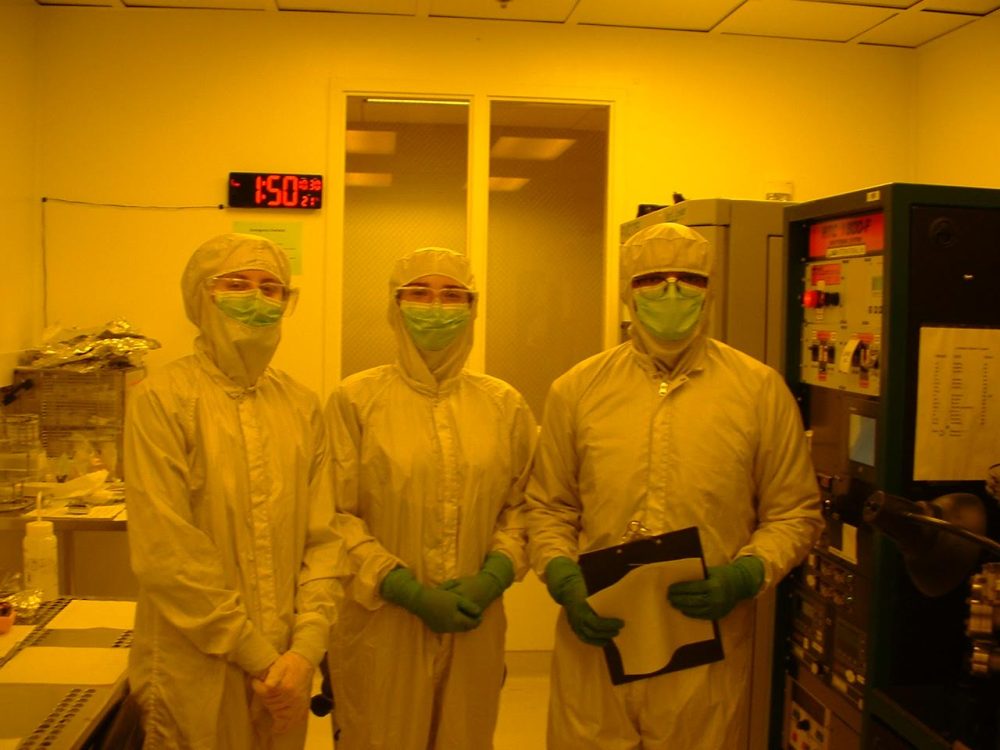
“I spent the last three years with the exact same students in every class, and we became really, really good friends,” Reed said. “I’m hoping the group stays together after graduating, too.”
Some of her core group graduated in fall 2024 and on Saturday, May 10, Reed takes her turn. Besides the connections made with her classmates, Reed will miss the outgoing professors who helped with her education and made her feel supported at every turn.
“I’ve had several professors write me letters of recommendation for various things, and I really appreciate all that they’ve done,” Reed said “I hope that at some point, I’ll be able to send them the work I’m doing and thank them again.”
During the summer, Reed, in collaboration with Dudley, will expand her analog gravity system and Hawking radiation research paper. Then, she will turn attention to applying to graduate schools, networking with researchers and seeking her next research project. But first, she will cross the stage at Halton Arena under the watchful eye of proud parents and loved ones.
“In high school, you dream of what you want to do when you grow up, but graduating with the degree that actually prepares you to do that is kind of surreal,” Reed said. “When I walk the stage, I’ll be kind of anxious but mostly excited.”
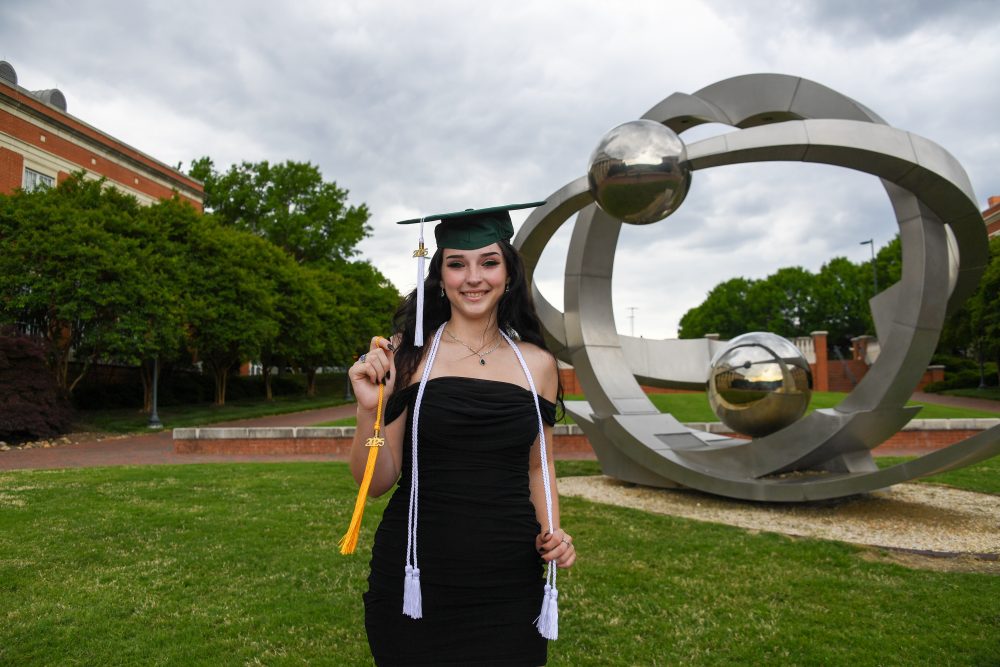
Story by Alex Reynolds, communications specialist. Photos by Jenn Conway, director of communications, and courtesy of Allison Reed.
Rooted in Curiosity: Taylor Yonemura’s Journey through Growth, Grit and Fungi at UNC Charlotte
Like with a flower, growth can come slowly for people. For Taylor Yonemura, the journey has taken time, but UNC Charlotte has given her a calling.
“UNC Charlotte offers opportunities for many things, but if you want something, you must put in the effort,” she said. “A lot of success in college is about trying and then learning.”
Yonemura, a Klein College of Science student, will graduate in May with a Bachelor of Arts in Biology. At UNC Charlotte, she learned perseverance, a trait she feels will propel her forward.
“Many people don’t emphasize that failing is okay,” said Yonemura. “You’ll make many mistakes as an adult, and you must be okay with admitting and forgiving yourself. That is such a valuable skill UNC Charlotte helped me develop.”
Finding Yourself
Yonemura moved around while growing up, stopping in Arizona and Utah before attending Mooresville Senior High School in North Carolina. A passion for art and science emerged during high school.
“I love understanding how things work, why they work and the steps in which they work. Science, for me, was always enjoyable. It’s a thought process, the same as art,” said Yonemura.
Her dad, Casey, was her biggest supporter along the way. Yonemura credits him for pushing her to be her true self.
“My dad is the one to whom I’ll give the biggest props. He always pushed for college, which was expected of me, just because he knew I could do it. Without him, I wouldn’t be here today,” said Yonemura.
Accessing Academia
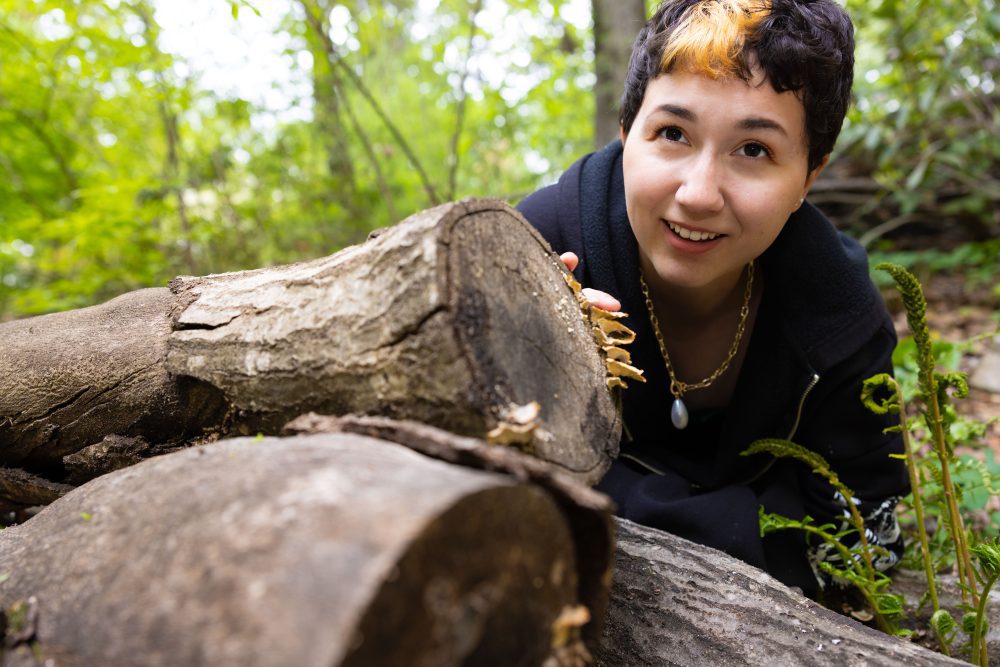
Yonemura started college at UNC Asheville in 2020 and focused on art. Then, while taking some time off, she developed a love for biology through gardening.
“I had to reevaluate many of the important things to me,” she said. “I picked up gardening, and growing vegetables led me to biology. I immediately changed my major and never returned.”
Yonemura returned to Mitchell Community College, earning an associate of arts degree in 2023. After a trip to the McMillan Greenhouse at UNC Charlotte’s Botanical Gardens, the next step in her academic journey became clear.
“A lot of my friends went to Charlotte as did my boyfriend, who wanted to show me the greenhouse,” Yonemura explained. “So we went one day, and when I came out, I said, ‘I’ve got to go here.’”
Making an Impact
Yonemura’s connection to the Botanical Gardens at UNC Charlotte started while volunteering for a creek cleanup. From there, she made good use of connecting science with art by developing its website.
“I love the Botanical Gardens and the people there, mainly because many are passionate about their work. Working among them has been such a great way to learn,” said Yonemura.
Her role helped Yonemura craft an undergraduate research project on the connection between bees and fungal spore dispersal. On April 17, she presented her project at the Undergraduate Research Conference at UNC Charlotte.
“Seeing those results was amazing because this was a research project that I built with my bare hands and got to apply the scientific process. I wanted to have my TED talk moment,” she said.
Yonemura, who continued to add to her résumé, gained valuable experience working with Morgan Carter in her fungal bacteria lab last summer.
“I went through the OUR program and did microbiology work that semester studying storage processes,” said Yonemura. “Dr. Carter is a wonderful person and a lab manager. She understands all her students and attempts to care about them in their best interests.”
All these experiences helped her start the Mycology Club, which brings students together to learn about fungi. Yonemura feels UNC Charlotte has allowed her to prepare for next steps.
“The most important thing is how much I’ve advanced. UNC Charlotte is a place to grow, and it fosters adult thinking.”
–Taylor Yonemura
Post-grad life
Yonemura is deciding between graphic design and continuing to work with fungus. She hopes to find a way to combine art and science productively.
“I want to explore the world and identify new fungi,” she said. “I know there’s something out there calling my name.”
Yonemura said she wants to be remembered as someone who pushed through no matter what.
“College is not just about the clubs you attend or the classes you take; it is about pushing yourself,” she said.“There were times I worried about failing a class, but I got through it — and without a solid support system and forgiving myself sometimes, that would have been impossible.”
Story by Bryson Foster. Photos by Amy Hart, creative photographic director.
Bryson Foster ’23 will complete a Master of Arts in Communication Studies in May 2025; he is an intern for the Office of University Communications.
KCOS faculty and students recognized at Invention of the Year ceremony
The Division of Research held the inaugural “Invention of the Year” awards at the Dubois Center on April 7. The ceremony recognized faculty and students in the categories of clean energy and power systems; information and data science; life sciences and health; and physical and material sciences.
This year’s highest honor, the Invention of the Year Excellence Award, was presented by Vice Chancellor for Research John L. Daniels to Kirill Afonin, professor of chemistry, and Yasmine Radwan, graduate student in chemistry and nanoscale science for their invention “RNA-DNA Fusomers with Tunable Physicochemical, Mechanical and Biological Properties for Diverse Biomedical Applications.” Afonin and Radwan’s innovative approach to nucleic acid-based therapy has the potential to revolutionize how diseases are treated, offering improved customization and reduced immune response in advanced biomedical applications.
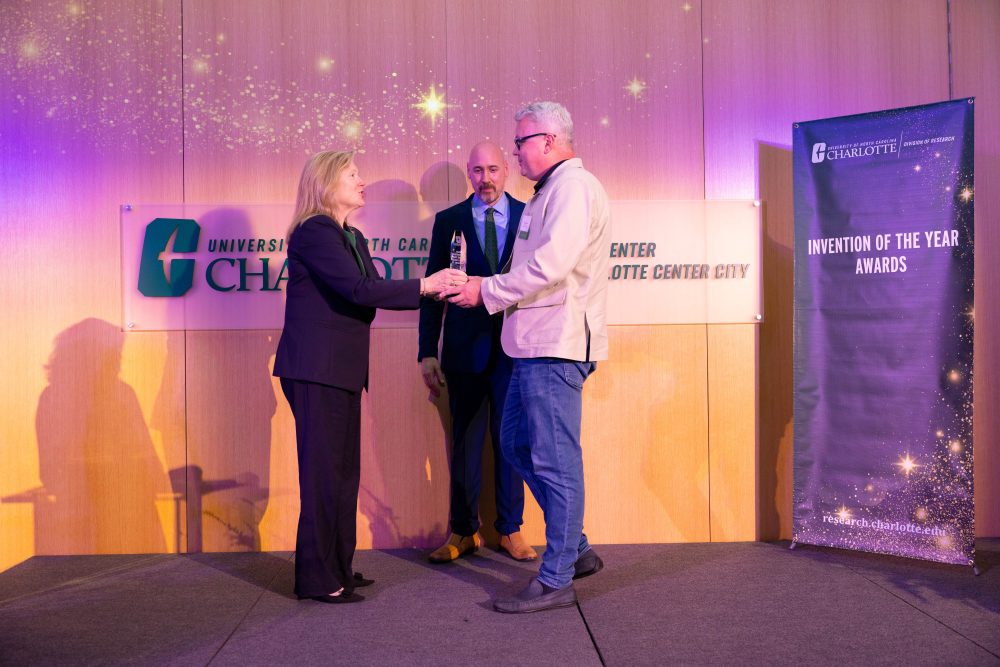
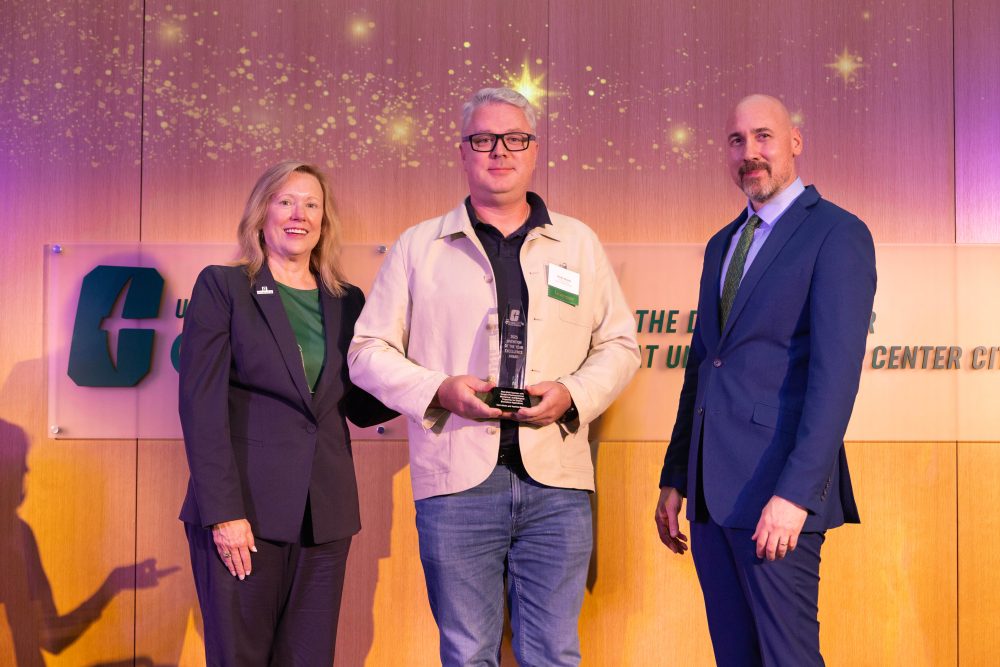
Deborah S.K. Thomas, associate vice chancellor for research, led the celebration of this year’s patent award winners, all from the Klein College of Science:
- Ishwar Aggarwal, research professor in physics and optical science, was honored as the University’s first National Academy of Inventors Fellow.
- Naz Fathma Tumpa, graduate student in chemistry and nanoscale science; and Aiden Hawkins, undergraduate student in chemistry, worked with advisors Michael Walter and Tyler Adams to place as the top five finalists in the National Collegiate Inventors Competition.
- Susan Trammell, professor of physics and optical science, earned third place in the PMU-NAI International Patent Award competition.
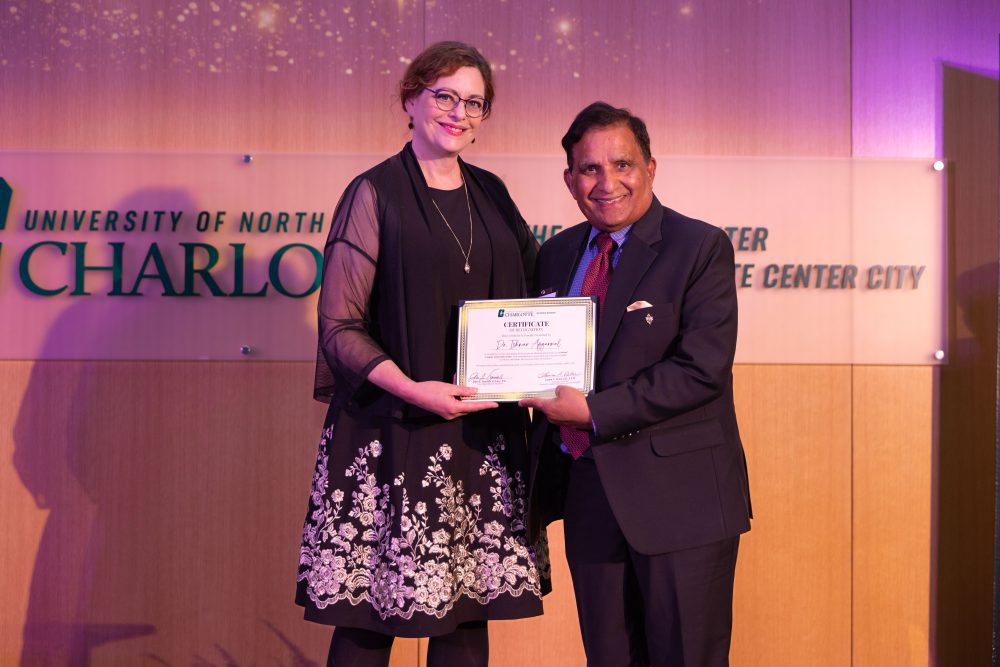
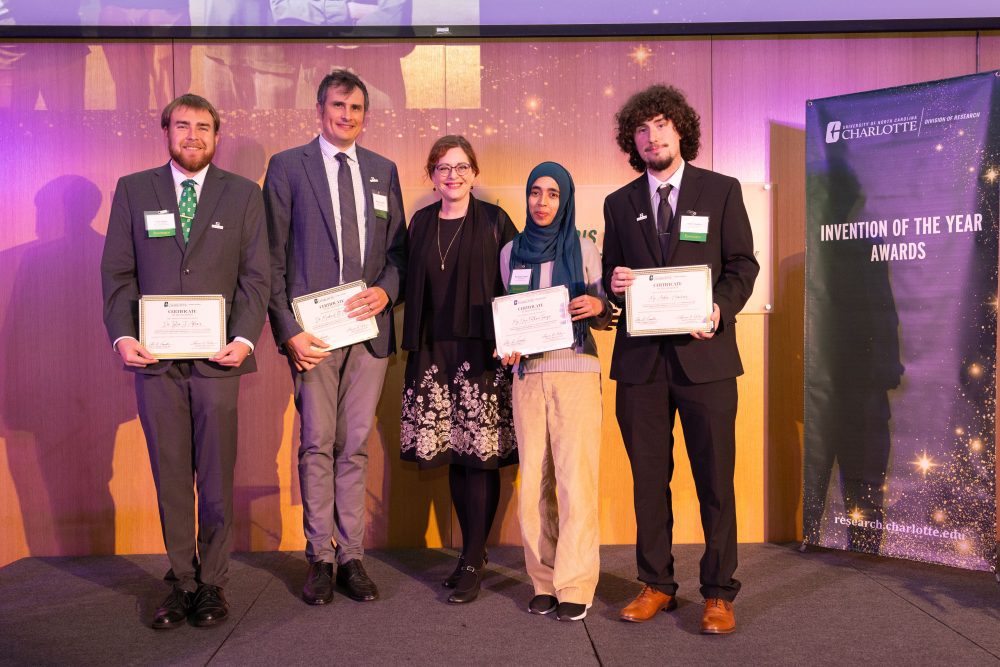
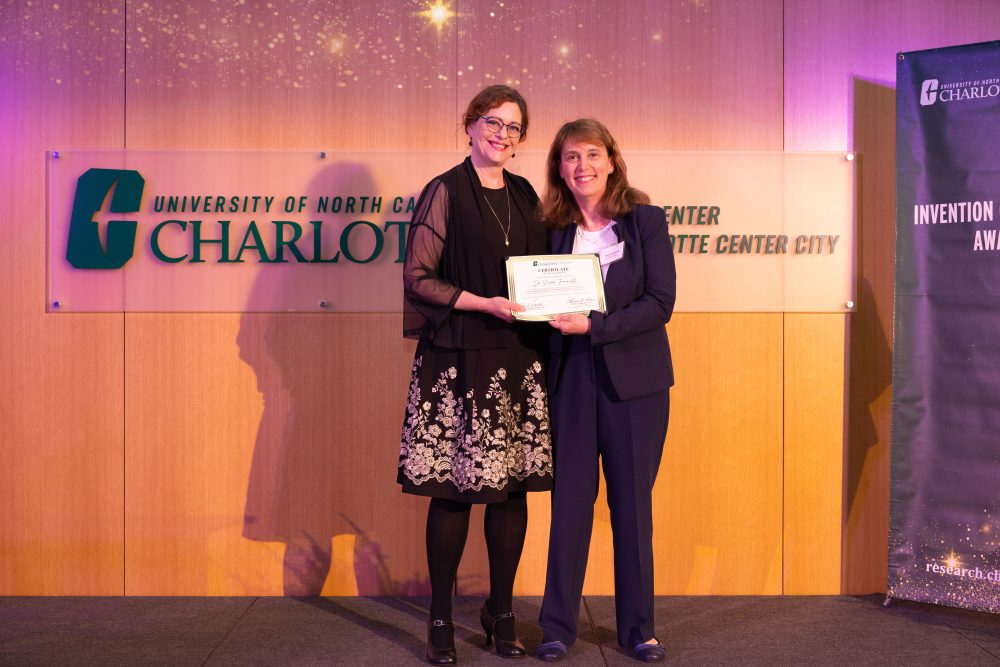
UNC Charlotte’s first class of National Academy of Inventors senior members were also recognized, honoring seven faculty for their outstanding contributions to innovation and research:
- Kirill Afonin, professor of chemistry
- James Amburgey, associate professor of civil and environmental engineering
- Glenn Boreman, professor and chair of the department of physics and optical science
- Olya Keen, associate professor of civil and environmental engineering
- Jordan Poler, professor of chemistry
- Susan Trammell, professor of physics and optical science
- Michael Walter, professor of chemistry
KCOS faculty honored for Million Dollar Research Circle
On March 26, Chancellor Sharon L. Gaber honored UNC Charlotte faculty with more than a million dollars in active external grant funding by recognizing them as part of the 2025 Million Dollar Research Circle.
The Klein College of Science was recognized as a top earner with $24 million in cumulative funding for the year, and the Department of Biological Sciences was honored as one of the top three departments in the university by funding.
10 faculty were recognized from KCOS:
- Kirill Afonin, chemistry
- Ishwar Aggarwal, physics and optical science
- Kristen Funk, biological sciences
- Danillo G. Augusto, biological sciences
- Ian Marriott, biological sciences
- Bao-Hua Song, biological sciences
- Andrew Truman, biological sciences
- Patricija van Oosten-Hawle, biological sciences
- Juan Vivero-Escoto, chemistry
- Shan Yan, biological sciences
Aggarwal and Augusto additionally received special recognition for each having more than $3 million in external funding.
Read more about the event and other UNC Charlotte honorees.
